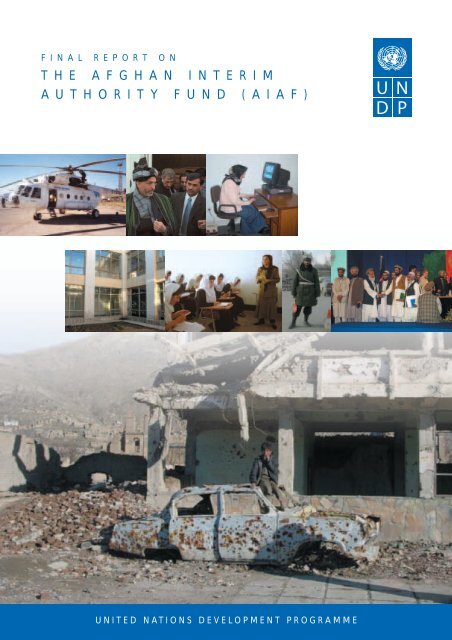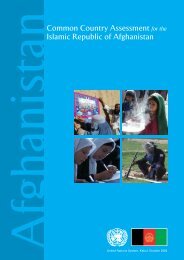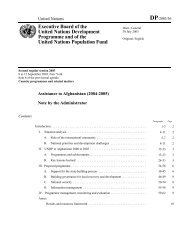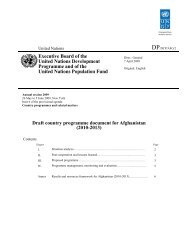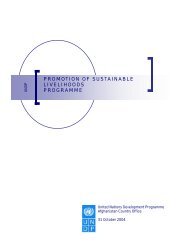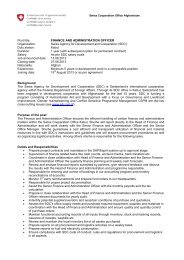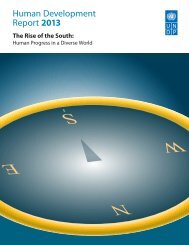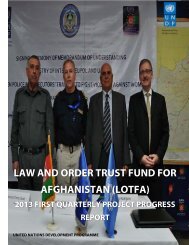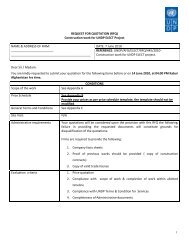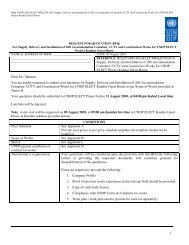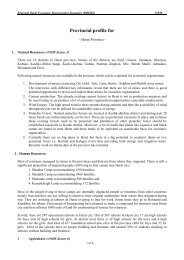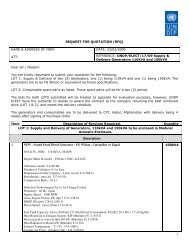Final Report on the Afghan Interim Authority Fund (AIAF) - UNDP ...
Final Report on the Afghan Interim Authority Fund (AIAF) - UNDP ...
Final Report on the Afghan Interim Authority Fund (AIAF) - UNDP ...
Create successful ePaper yourself
Turn your PDF publications into a flip-book with our unique Google optimized e-Paper software.
F I N A L R E P O R T O N<br />
T H E A F G H A N I N T E R I M<br />
A U T H O R I T Y F U N D ( A I A F )<br />
UNITED NATIONS DEVELOPMENT PROGRAMME
<strong>UNDP</strong> is <strong>the</strong> UN’s global development network, advocating for change and c<strong>on</strong>necting countries<br />
to knowledge, experience and resources to help people build a better life. We are <strong>on</strong> <strong>the</strong><br />
ground in 166 countries, working with <strong>the</strong>m <strong>on</strong> <strong>the</strong>ir own soluti<strong>on</strong>s to global and nati<strong>on</strong>al<br />
development challenges. As <strong>the</strong>y develop local capacity, <strong>the</strong>y draw <strong>on</strong> <strong>the</strong> people of <strong>UNDP</strong> and<br />
our wide range of partners.<br />
World leaders have pledged to achieve <strong>the</strong> Millennium Development Goals, including <strong>the</strong> overarching<br />
goal of cutting poverty in half by 2015. <strong>UNDP</strong>’s network links and coordinates global<br />
and nati<strong>on</strong>al efforts to reach <strong>the</strong>se Goals. Our focus is helping countries build and share soluti<strong>on</strong>s<br />
to <strong>the</strong> challenges of:<br />
● Democratic Governance<br />
● Poverty Reducti<strong>on</strong><br />
● Crisis Preventi<strong>on</strong> and Recovery<br />
● Energy and Envir<strong>on</strong>ment<br />
● Informati<strong>on</strong> and Communicati<strong>on</strong>s Technology<br />
● HIV/AIDS<br />
<strong>UNDP</strong> helps developing countries attract and use aid effectively. In all our activities, we encourage<br />
<strong>the</strong> protecti<strong>on</strong> of human rights and <strong>the</strong> empowerment of women.
F I N A L R E P O R T O N<br />
T H E A F G H A N I N T E R I M<br />
A U T H O R I T Y F U N D ( A I A F )<br />
UNITED NATIONS DEVELOPMENT PROGRAMME
C ONTENTS<br />
I. BACKGROUND, ESTABLISHMENT AND<br />
IMPLEMENTATION OF THE <strong>AIAF</strong> 4<br />
II. PROGRAMMATIC SCOPE AND OUTPUTS OF THE <strong>AIAF</strong> 6<br />
II.I. PAY M E N T O F C I V I L S E R VA N T S A L ARIES 7<br />
II.II. IMPLEMENTATION OF THE BONN AGREEMENT 15<br />
II.III. REHABILITATION OF ESSENTIAL GOVERNMENT FACILITIES 20<br />
III. CONSTRAINTS ENCOUNTERED IN THE 23<br />
IMPLEMENTATION OF ACTIVITIES<br />
IV. SUCCESS FACTORS 24<br />
V. OVERALL OUTCOMES OF THE <strong>AIAF</strong> SUPPORT 25<br />
VI. <strong>AIAF</strong> FINANCIAL REPORT 27<br />
2 FINAL REPORT ON THE AFGHAN INTERIM AUTHORITY FUND
Iam pleased to present <strong>the</strong> final report <strong>on</strong> <strong>the</strong> <strong>Afghan</strong> <strong>Interim</strong> <strong>Authority</strong> <strong>Fund</strong>, which was managed<br />
and implemented by <strong>UNDP</strong> under <strong>the</strong> overall leadership of Ambassador Lakhdar Brahimi, Special<br />
Representative of <strong>the</strong> Secretary General for <strong>Afghan</strong>istan. The report provides a full account of <strong>the</strong><br />
outputs delivered and outcomes achieved, as well as an analysis of implementati<strong>on</strong> c<strong>on</strong>straints and<br />
success factors.<br />
The signing of <strong>the</strong> B<strong>on</strong>n Agreement in December 2001 called for an unprecedented resp<strong>on</strong>se by <strong>the</strong><br />
internati<strong>on</strong>al community in support of <strong>the</strong> newly established <strong>Afghan</strong> <strong>Interim</strong> <strong>Authority</strong>. The <strong>AIAF</strong><br />
provided immediate and flexible support and critically helped to bridge <strong>the</strong> gap between humanitarian<br />
aid and l<strong>on</strong>ger-term development assistance. It enabled <strong>the</strong> <strong>Afghan</strong> <strong>Interim</strong> <strong>Authority</strong> to assume office<br />
and exercise a firm leadership <strong>on</strong> <strong>the</strong> fostering of peace and rec<strong>on</strong>structi<strong>on</strong> in <strong>Afghan</strong>istan.<br />
On behalf of <strong>UNDP</strong>, I would like to express sincere gratitude for <strong>the</strong> generosity of a wide range of<br />
d<strong>on</strong>ors that supported <strong>the</strong> <strong>AIAF</strong> with rapid and flexible resources. They are: Aga Khan Foundati<strong>on</strong>,<br />
Australia, Belgium, Canada, Denmark, European Commissi<strong>on</strong>, Finland, France, Germany, Ireland,<br />
Israel, Italy, Japan, Republic of Korea, Luxembourg, Ne<strong>the</strong>rlands, Norway, <strong>the</strong> Philippine Government<br />
Commissi<strong>on</strong> <strong>on</strong> Audit, Saudi Arabia, Spain, Sweden, Switzerland, Thailand (private c<strong>on</strong>tributi<strong>on</strong>),<br />
Turkey, United Kingdom and <strong>the</strong> United States of America. Detailed informati<strong>on</strong> <strong>on</strong> <strong>the</strong>ir c<strong>on</strong>tributi<strong>on</strong>s<br />
is available in <strong>the</strong> financial annex.<br />
The <strong>UNDP</strong> Country Office in <strong>Afghan</strong>istan provided str<strong>on</strong>g support to <strong>the</strong> <strong>Fund</strong> and its Senior<br />
Advisor Raquel Ragragio, who did a splendid job overseeing <strong>the</strong> day-to-day implementati<strong>on</strong> of <strong>AIAF</strong><br />
activities. Her professi<strong>on</strong>alism and dedicati<strong>on</strong> ensured <strong>the</strong> smooth implementati<strong>on</strong> of a complex operati<strong>on</strong>,<br />
and I would like to thank her pers<strong>on</strong>ally for her extraordinary commitment.<br />
The <strong>AIAF</strong> internati<strong>on</strong>al project partners GTZ (German Technical Cooperati<strong>on</strong>), UNOPS (United<br />
Nati<strong>on</strong>s Office for Project Services), and IAPSO (Inter-Agency Procurement Services Office) all<br />
implemented high quality services in a difficult and challenging envir<strong>on</strong>ment.The str<strong>on</strong>g leadership and<br />
guidance of UNAMA throughout <strong>the</strong> durati<strong>on</strong> of <strong>the</strong> <strong>AIAF</strong> ensured its effectiveness.<br />
Last but not least, I would like to thank <strong>the</strong> <strong>Afghan</strong> <strong>Interim</strong> <strong>Authority</strong> and <strong>the</strong> successor Transiti<strong>on</strong>al<br />
Administrati<strong>on</strong> for <strong>the</strong> excellent cooperati<strong>on</strong> <strong>on</strong> <strong>the</strong> <strong>AIAF</strong> implementati<strong>on</strong>. N<strong>on</strong>e of our work would<br />
have been possible without <strong>the</strong> leadership of <strong>the</strong> <strong>Interim</strong> <strong>Authority</strong> and <strong>the</strong> determinati<strong>on</strong> and commitment<br />
of <strong>the</strong> people of <strong>Afghan</strong>istan to rebuild <strong>the</strong>ir nati<strong>on</strong>.<br />
Julia Taft<br />
Assistant Administrator and Director<br />
Bureau for Crisis Preventi<strong>on</strong> and Recovery<br />
3 March 2003<br />
UNITED NATIONS DEVELOPMENT PROGRAMME 3
I. BACKGROUND, ESTABLISHMENT<br />
AND IMPLEMENTATION OF THE <strong>AIAF</strong><br />
UN/DPI UNAMA<br />
President Hamid Karzai<br />
Ambassador Lakhdar<br />
Brahimi, SRSG for <strong>Afghan</strong>istan<br />
The B<strong>on</strong>n Agreement, signed <strong>on</strong> 5<br />
December 2001, made provisi<strong>on</strong>s for <strong>the</strong><br />
establishment of an <strong>Afghan</strong> <strong>Interim</strong><br />
<strong>Authority</strong> (AIA) charged to take office from 22<br />
December 2001. While <strong>the</strong> newly created <strong>Interim</strong><br />
<strong>Authority</strong> had internati<strong>on</strong>al legitimacy and<br />
recogniti<strong>on</strong>, it faced<br />
<strong>the</strong> great challenge to<br />
establish its offices in<br />
<strong>Afghan</strong>istan and to<br />
earn <strong>the</strong> trust of <strong>the</strong><br />
<strong>Afghan</strong> people, including<br />
<strong>the</strong> loyalty of<br />
civil servants. Civil<br />
servants had not been<br />
paid for more than five<br />
m<strong>on</strong>ths, nor had basic<br />
social services been<br />
available to citizens.<br />
But <strong>the</strong> <strong>Interim</strong><br />
<strong>Authority</strong> did not<br />
have any domestic revenues<br />
of its own and<br />
relied <strong>on</strong> speedy budgetary<br />
assistance from<br />
<strong>the</strong> internati<strong>on</strong>al community.<br />
Following <strong>the</strong> B<strong>on</strong>n Agreement, <strong>the</strong> <strong>Afghan</strong>istan<br />
Support Group met in Berlin, and d<strong>on</strong>ors<br />
called up<strong>on</strong> <strong>UNDP</strong> to set up a flexible mechanism<br />
for quick resource mobilizati<strong>on</strong>, immediate<br />
disbursement and initial instituti<strong>on</strong> building. The<br />
aim was to support <strong>the</strong> <strong>Interim</strong> <strong>Authority</strong> during<br />
its six m<strong>on</strong>ths tenure prior to <strong>the</strong> holding of an<br />
Emergency Loya Jirga and prior too to <strong>the</strong> establishment<br />
of financing modalities for l<strong>on</strong>ger-term<br />
budget support and rec<strong>on</strong>structi<strong>on</strong> efforts.<br />
Under <strong>the</strong> overall leadership of <strong>the</strong> Special<br />
Representative of <strong>the</strong> Secretary General and<br />
within <strong>the</strong> framework of <strong>the</strong> UN integrated<br />
Assistance Missi<strong>on</strong> for <strong>Afghan</strong>istan (UNAMA),<br />
<strong>UNDP</strong> established <strong>the</strong> <strong>Afghan</strong> <strong>Interim</strong> <strong>Authority</strong><br />
<strong>Fund</strong> (<strong>AIAF</strong>) designed to be sufficiently flexible<br />
to cover all reas<strong>on</strong>able costs associated with<br />
start-up and operati<strong>on</strong>al costs of <strong>the</strong> <strong>Interim</strong><br />
<strong>Authority</strong>. D<strong>on</strong>ors generously c<strong>on</strong>tributed<br />
US$ 73.4 milli<strong>on</strong> to pay for <strong>the</strong> most pressing<br />
needs of re-establishing <strong>the</strong> civil service, including<br />
recruitment, salary payment, winterisati<strong>on</strong><br />
of government buildings, procurement of office<br />
equipment and vehicles for <strong>the</strong> new ministers,<br />
and o<strong>the</strong>r essential costs required to sustain <strong>the</strong><br />
functi<strong>on</strong>s of <strong>the</strong> new <strong>Authority</strong>.<br />
To enable <strong>the</strong> <strong>Interim</strong> <strong>Authority</strong> to lead <strong>the</strong><br />
transiti<strong>on</strong> to peace and to prevent a relapse into<br />
violent c<strong>on</strong>flict, a quick resp<strong>on</strong>se was imperative.<br />
Despite <strong>the</strong> absence of financial infrastructure<br />
in <strong>Afghan</strong>istan, <strong>the</strong> lack of a functi<strong>on</strong>ing<br />
Civil Service Commissi<strong>on</strong> and even basic data<br />
for public payrolls (estimates <strong>on</strong> <strong>the</strong> total number<br />
of civil servants in <strong>the</strong> line varied from<br />
10,000 to 230,000), a civil service payroll system<br />
was set up within <strong>the</strong> Ministry of Finance <strong>on</strong>ly<br />
<strong>on</strong>e m<strong>on</strong>th after <strong>the</strong> signing of <strong>the</strong> B<strong>on</strong>n Agreement.<br />
From January to July 2002, salary payrolls<br />
were re-established for all 32 provinces of<br />
<strong>Afghan</strong>istan, salary payment c<strong>on</strong>trol systems<br />
were installed in <strong>the</strong> Ministry of Finance,<br />
finance staff was trained, including in ICTrelated<br />
skills, and emergency repairs were completed<br />
for 30 ministerial offices of <strong>the</strong> <strong>Afghan</strong><br />
<strong>Interim</strong> <strong>Authority</strong>. The <strong>AIAF</strong> fur<strong>the</strong>r supported<br />
<strong>the</strong> commissi<strong>on</strong>s created under <strong>the</strong> B<strong>on</strong>n<br />
Agreement, including <strong>the</strong> Emergency Loya<br />
Jirga that endorsed <strong>the</strong> Transiti<strong>on</strong>al Administrati<strong>on</strong><br />
led by President Hamid Karzai.<br />
Under <strong>the</strong> overall leadership of <strong>the</strong> SRSG,<br />
and with a direct reporting line to <strong>the</strong> Deputy<br />
SRSG and UN Resident Coordinator/<strong>UNDP</strong><br />
Resident Representative, a <strong>UNDP</strong> Senior Advisor<br />
was in charge of <strong>the</strong> day-to-day management<br />
of <strong>the</strong> <strong>AIAF</strong>. The <strong>UNDP</strong> Country Office was<br />
resp<strong>on</strong>sible for <strong>the</strong> direct executi<strong>on</strong> of activities<br />
and for local coordinati<strong>on</strong> with UNAMA and<br />
representatives of <strong>the</strong> <strong>Interim</strong> <strong>Authority</strong>. In<br />
<strong>UNDP</strong> Headquarters in New York, over-all<br />
management of <strong>the</strong> <strong>Fund</strong> as well as backstopping<br />
and resource mobilizati<strong>on</strong> was facilitated by <strong>the</strong><br />
Bureau for Crisis Preventi<strong>on</strong> and Recovery under<br />
4 FINAL REPORT ON THE AFGHAN INTERIM AUTHORITY FUND
<strong>UNDP</strong><br />
<strong>the</strong> leadership of <strong>the</strong> Assistant Administrator<br />
and Bureau Director.<br />
In accordance with <strong>the</strong> exit strategy devised<br />
for <strong>the</strong> <strong>AIAF</strong> prior to its establishment, <strong>the</strong><br />
<strong>Fund</strong> ceased operati<strong>on</strong>s after <strong>the</strong> successful c<strong>on</strong>clusi<strong>on</strong><br />
of <strong>the</strong> Loya Jirga and <strong>the</strong> installati<strong>on</strong> of<br />
<strong>the</strong> Transiti<strong>on</strong>al Administrati<strong>on</strong>. Budgetary<br />
support for <strong>the</strong> Transiti<strong>on</strong>al Administrati<strong>on</strong> was<br />
taken over by <strong>the</strong> <strong>Afghan</strong>istan Rec<strong>on</strong>structi<strong>on</strong><br />
Trust <strong>Fund</strong> (ARTF) jointly prepared and managed<br />
by <strong>the</strong> World Bank, <strong>the</strong> Asian Development<br />
Bank, <strong>the</strong> Islamic Development Bank and<br />
<strong>UNDP</strong>, and administered by <strong>the</strong> World Bank.<br />
The <strong>AIAF</strong> provided an operati<strong>on</strong>al backb<strong>on</strong>e<br />
for <strong>the</strong> SRSG’s support to <strong>the</strong> <strong>Afghan</strong><br />
<strong>Interim</strong> <strong>Authority</strong>. It enabled <strong>the</strong> internati<strong>on</strong>al<br />
community to resp<strong>on</strong>d to <strong>the</strong> urgent needs and<br />
to disburse assistance without delay, while<br />
ensuring a reliable level of transparency and<br />
accountability. As a result, <strong>the</strong> <strong>Afghan</strong> <strong>Interim</strong><br />
<strong>Authority</strong> increased its capacity to build stability,<br />
to provide essential services, to absorb and<br />
manage internati<strong>on</strong>al assistance, and to plan for<br />
<strong>Afghan</strong>istan’s l<strong>on</strong>ger-term rec<strong>on</strong>structi<strong>on</strong>.<br />
By far <strong>the</strong> most important outcome of <strong>the</strong><br />
<strong>AIAF</strong> assistance was <strong>the</strong> success of <strong>the</strong> <strong>Interim</strong><br />
<strong>Authority</strong> to gain legitimacy in <strong>the</strong> eyes of <strong>the</strong><br />
<strong>Afghan</strong> people, to pave <strong>the</strong> way for <strong>the</strong> c<strong>on</strong>venti<strong>on</strong><br />
of an Emergency Loya Jirga, and to make<br />
undeniable progress in <strong>the</strong> difficult task of<br />
bringing peace to <strong>Afghan</strong>istan.<br />
The rec<strong>on</strong>structi<strong>on</strong> of<br />
<strong>Afghan</strong>istan remains a<br />
challenging task: a street<br />
in Kabul in February 2003<br />
UNITED NATIONS DEVELOPMENT PROGRAMME 5
II.<br />
PROGRAMMATIC SCOPE<br />
AND OUTPUTS OF THE <strong>AIAF</strong><br />
In accordance with <strong>the</strong> Terms of Reference<br />
of <strong>the</strong> <strong>Afghan</strong> <strong>Interim</strong> <strong>Authority</strong> <strong>Fund</strong>,<br />
resources were c<strong>on</strong>tributed by d<strong>on</strong>ors to help<br />
finance:<br />
●<br />
●<br />
●<br />
Administrative costs associated with <strong>the</strong><br />
establishment of <strong>the</strong> <strong>Afghan</strong> <strong>Interim</strong><br />
<strong>Authority</strong>, such as <strong>the</strong> payment of<br />
government salaries, acquisiti<strong>on</strong> of space,<br />
vehicles, office equipment and supplies;<br />
Essential repairs of administrative<br />
facilities and maintenance;<br />
Support to <strong>the</strong> implementati<strong>on</strong> of special<br />
resp<strong>on</strong>sibilities outlined in <strong>the</strong> B<strong>on</strong>n<br />
Agreement such as <strong>the</strong> establishment<br />
●<br />
●<br />
of a Civil Service Commissi<strong>on</strong>, a Judicial<br />
Commissi<strong>on</strong>, a Human Rights Commissi<strong>on</strong>,<br />
and support for <strong>the</strong> c<strong>on</strong>vening of <strong>the</strong><br />
Emergency Loya Jirga;<br />
Teachers salaries to ensure <strong>the</strong> nati<strong>on</strong>’s<br />
schools reopen;<br />
Additi<strong>on</strong>al public service recurrent<br />
costs c<strong>on</strong>sidered critical by <strong>the</strong> <strong>Afghan</strong><br />
<strong>Interim</strong> <strong>Authority</strong>, such as <strong>the</strong> salaries<br />
of <strong>the</strong> civilian police.<br />
This secti<strong>on</strong> of <strong>the</strong> <strong>AIAF</strong> <str<strong>on</strong>g>Report</str<strong>on</strong>g> describes<br />
how <strong>the</strong> mandate was implemented and what<br />
<strong>the</strong> <strong>Interim</strong> <strong>Authority</strong> achieved with <strong>AIAF</strong><br />
support.<br />
CLOSE UP ON FORMER DEPUTY FINANCE MINISTER SAMI WALI<br />
<strong>UNDP</strong><br />
Deputy Finance Minister Sami Wali, toge<strong>the</strong>r<br />
with a Working Group of <strong>Afghan</strong> experts, initiated<br />
<strong>the</strong> repayment of civil servant salaries<br />
throughout <strong>the</strong> country in January 2002.<br />
Said Wali:“When <strong>the</strong> Taliban c<strong>on</strong>trolled <strong>the</strong><br />
finance sector, <strong>the</strong>y did not follow <strong>the</strong> former<br />
laws and principles of <strong>the</strong> country, and many<br />
civil servants had not received payment of<br />
<strong>the</strong>ir salaries for many years.”<br />
With resources provided by <strong>the</strong> <strong>Afghan</strong><br />
<strong>Interim</strong> <strong>Authority</strong> <strong>Fund</strong>, Wali worked closely<br />
with <strong>UNDP</strong> to administer <strong>the</strong> first payments<br />
that also included incentive allowances and<br />
transportati<strong>on</strong> costs. Working from dawn to<br />
dusk, Wali and his team began to identify pers<strong>on</strong>s<br />
to be paid, hours worked and attendance<br />
records. Many of <strong>the</strong>se files were missing and<br />
<strong>the</strong> government sp<strong>on</strong>sored an assessment<br />
team to go out to <strong>the</strong> provinces and prepare a<br />
payroll table <strong>on</strong> <strong>the</strong> basis of pers<strong>on</strong>nel files. As<br />
n<strong>on</strong>e of <strong>the</strong>se files were computerized, this<br />
process was both lengthy and tedious.<br />
On average, each pers<strong>on</strong> received AFS 1.4<br />
milli<strong>on</strong> paid by funds from <strong>the</strong> <strong>Afghan</strong> <strong>Interim</strong><br />
<strong>Authority</strong> <strong>Fund</strong>.<br />
“<strong>UNDP</strong> played a critical role in this process<br />
as <strong>the</strong>y assisted in airlifting (by helicopter) <strong>the</strong><br />
delivery of civil servant payments to <strong>the</strong><br />
provinces which was very risky due to security<br />
c<strong>on</strong>cerns.”<br />
In recent m<strong>on</strong>ths, <strong>the</strong> Ministry of Finance<br />
has trained staff in payroll services and regulati<strong>on</strong>s.The<br />
Transiti<strong>on</strong>al Administrati<strong>on</strong> has since<br />
set up a m<strong>on</strong>itoring and distributi<strong>on</strong> process<br />
to follow-up with payments issued and has<br />
greatly advanced in organizing salary payments<br />
to <strong>the</strong> people who serve <strong>Afghan</strong>istan.<br />
6 FINAL REPORT ON THE AFGHAN INTERIM AUTHORITY FUND
II.I.<br />
PAYMENT OF<br />
CIVIL SERVANT SALARIES<br />
Prior to <strong>the</strong> implementati<strong>on</strong> of <strong>the</strong> <strong>AIAF</strong><br />
support, a number of complex questi<strong>on</strong>s<br />
required immediate resp<strong>on</strong>se. These<br />
included: “Who should be paid?”, “How much<br />
should <strong>the</strong>y be paid?”, “In which currency<br />
should <strong>the</strong>y be paid?”, and “How can salaries be<br />
paid?”. <strong>UNDP</strong> received guidance <strong>on</strong> all of <strong>the</strong>se<br />
questi<strong>on</strong>s from <strong>the</strong> SRSG’s office, which took<br />
<strong>the</strong> lead in defining workable and adequate<br />
soluti<strong>on</strong>s with <strong>the</strong> <strong>Afghan</strong> Authorities.<br />
With regards to <strong>the</strong> first questi<strong>on</strong>: “Who<br />
should be paid?”, it was decided that <strong>UNDP</strong><br />
would authorize salary payments against certified<br />
payrolls presented by <strong>the</strong> <strong>Interim</strong> <strong>Authority</strong>.<br />
The public payroll covered all ministries in<br />
Kabul and o<strong>the</strong>r government offices, including<br />
<strong>the</strong> executive and its advisors, <strong>the</strong> commissi<strong>on</strong>s<br />
set up under <strong>the</strong> B<strong>on</strong>n Agreement, regi<strong>on</strong>al<br />
government offices, educati<strong>on</strong>al instituti<strong>on</strong>s and<br />
<strong>the</strong> police force in Kabul.<br />
servants that had been dismissed during <strong>the</strong><br />
Taliban era, including former women employees.<br />
The Expert Working Group (or Inter-<br />
Ministerial Review Commissi<strong>on</strong>) received<br />
detailed payroll informati<strong>on</strong><br />
<strong>on</strong> a m<strong>on</strong>thly<br />
basis from <strong>the</strong> ministries<br />
and government offices<br />
in Kabul as well as from<br />
provincial authorities.<br />
Samples of payment request<br />
and manually produced<br />
summary payroll for 87<br />
teachers in three schools<br />
ESTABLISHMENT OF THE<br />
<strong>AIAF</strong> PAYROLL SYSTEM<br />
In order to determine how salaries should be paid,<br />
<strong>the</strong> Office of <strong>the</strong> SRSG and <strong>UNDP</strong> brought<br />
toge<strong>the</strong>r a Working Group of <strong>Afghan</strong> experts,<br />
which was c<strong>on</strong>vened under <strong>the</strong> chairmanship of<br />
<strong>the</strong> Ministry of Finance. This Expert Working<br />
Group assumed a lead role in <strong>the</strong> payment of civil<br />
service salaries, starting with <strong>the</strong> compilati<strong>on</strong> of<br />
lists of employees for all government instituti<strong>on</strong>s<br />
to reviewing payrolls submitted by <strong>the</strong> ministries<br />
and regi<strong>on</strong>al authorities. An important goal of its<br />
work was to update payrolls for returning civil<br />
<strong>UNDP</strong><br />
Female civil servants<br />
UNITED NATIONS DEVELOPMENT PROGRAMME 7
<strong>AIAF</strong> IMPLEMENTED PAYROLL SYSTEM – NARRATIVE PROCEDURES<br />
Activity<br />
Number Unit C<strong>on</strong>cerned Procedures Involved<br />
1 Finance Secti<strong>on</strong> of <strong>the</strong> Receives <strong>the</strong> Attendance Sheets from <strong>the</strong> Pers<strong>on</strong>nel Secti<strong>on</strong><br />
Ministry c<strong>on</strong>cerned at <strong>the</strong> end of each m<strong>on</strong>th.<br />
2 Same Prepares <strong>the</strong> Payroll (M41) based <strong>on</strong> <strong>the</strong> Pers<strong>on</strong>nel Records<br />
(M40) <strong>on</strong> file and <strong>the</strong> attendance sheets.The payroll c<strong>on</strong>tains<br />
<strong>the</strong> following informati<strong>on</strong> name, fa<strong>the</strong>r’s name, grade,<br />
job title, grade salary, positi<strong>on</strong> salary, food allowance,<br />
professi<strong>on</strong>al incentive total gross pay, less 3% pensi<strong>on</strong> fund<br />
c<strong>on</strong>tributi<strong>on</strong>, net pay.<br />
3 Same Based <strong>on</strong> <strong>the</strong> M41 prepared, summarizes <strong>the</strong> entries<br />
c<strong>on</strong>tained in <strong>the</strong> payroll and prepares <strong>the</strong> M16 in two copies.<br />
4 Finance Unit and The staff member resp<strong>on</strong>sible for <strong>the</strong> preparati<strong>on</strong> of <strong>the</strong><br />
Unit C<strong>on</strong>cerned<br />
payroll and <strong>the</strong> Head of <strong>the</strong> Unit sign <strong>the</strong> payroll.<br />
5 Offices of <strong>the</strong> Deputy The Deputy Minister recommends approval and <strong>the</strong> Minister<br />
Minister and <strong>the</strong> Minister approves <strong>the</strong> payroll.<br />
6 Accountant Certifies correctness of <strong>the</strong> amounts claimed and journalizes<br />
<strong>the</strong> entries.<br />
7 Comptroller, Pre-audits <strong>the</strong> payroll and signs <strong>on</strong> <strong>the</strong> payroll<br />
Ministry of Finance (with red-inked pen).<br />
8 Ministry of Finance, Receives from <strong>the</strong> Ministries c<strong>on</strong>cerned <strong>the</strong> payroll (M41)<br />
Finance Secti<strong>on</strong><br />
and <strong>the</strong> attendance sheets with <strong>the</strong> covering M16 and<br />
forwards <strong>the</strong> documents to <strong>the</strong> Experts Working Group.<br />
9 Experts Working Group C<strong>on</strong>ducts final pre-audit by matching attendance sheets<br />
with <strong>the</strong> payroll, re-computes net pay and ensures that<br />
individual claimants are granted proper entitlements as far<br />
as food allowances, professi<strong>on</strong>al incentives and pensi<strong>on</strong>s<br />
are c<strong>on</strong>cerned. This Review Committee or Experts Working<br />
Group was c<strong>on</strong>vened by he <strong>UNDP</strong> and is composed of<br />
representatives from various ministries (inter-ministries).<br />
10 Office of Acting Deputy Up<strong>on</strong> receipt of pre-audited payrolls from <strong>the</strong> Experts<br />
Minister of Finance WorkingGroup, prepares <strong>the</strong> request for payment.<br />
11 Acting Deputy Minister Signs to authorize <strong>the</strong> Request for Payment.<br />
of Finance<br />
12 Same Recommends payment and forwards <strong>the</strong> documents to <strong>the</strong><br />
<strong>UNDP</strong> Senior Finance Advisor.<br />
13 Senior Finance Makes final verificati<strong>on</strong> to ensure validity and funds<br />
Advisor, <strong>UNDP</strong><br />
availability and approves request for payment.<br />
14 Same Forwards documents back to <strong>the</strong> Acting Deputy for Finance.<br />
15 Treasury Department Prepares <strong>the</strong> check up<strong>on</strong> instructi<strong>on</strong> of <strong>the</strong> Acting Deputy<br />
for Finance.<br />
16 Treasury Department Signing authorities:<br />
If less than AFS 50 milli<strong>on</strong>, Senior Treasury Official signs, if<br />
more than AFS 50 milli<strong>on</strong> <strong>Afghan</strong>is, President of Treasury<br />
Department signs. Both <strong>the</strong> Acting Deputy Minister and <strong>the</strong><br />
Minister countersign checks.<br />
17 Cashier of Ministry Checks are in <strong>the</strong> name of <strong>the</strong> Cashier of <strong>the</strong> Ministry<br />
c<strong>on</strong>cerned<br />
c<strong>on</strong>cerned. When <strong>the</strong> payroll check is en-cashed, <strong>the</strong> Cashier<br />
is accompanied by three m<strong>on</strong>itors identified by <strong>the</strong> Ministry<br />
c<strong>on</strong>cerned.The au<strong>the</strong>nticity of his signature is also ensured<br />
by <strong>the</strong> Central Bank.<br />
8 FINAL REPORT ON THE AFGHAN INTERIM AUTHORITY FUND
<strong>AIAF</strong> IMPLEMENTED PAYROLL SYSTEM – FLOW CHART<br />
MINISTRIES CONCERNED<br />
FINANCE SECTION<br />
From<br />
Recruitment<br />
Process<br />
1<br />
From Pers<strong>on</strong>nel<br />
Secti<strong>on</strong> at <strong>the</strong><br />
end of <strong>the</strong> m<strong>on</strong>th<br />
MINISTRY OF FINANCE<br />
Pers<strong>on</strong>el<br />
Records<br />
(M40)<br />
Attendance<br />
Records<br />
8<br />
Payroll<br />
(M41)<br />
Attendance<br />
Records<br />
Summary<br />
Payroll<br />
(M16)<br />
13 <strong>UNDP</strong> Senior Finance<br />
Advisor c<strong>on</strong>trols<br />
availability of funds<br />
and approves payment<br />
2 3<br />
Payroll<br />
(M41)<br />
4<br />
5<br />
Staff member that<br />
prepared payroll<br />
and Head of Unit sign<br />
Deputy Minister<br />
recommends approval<br />
and Minister approves<br />
Summary<br />
Payroll<br />
(M16)<br />
9<br />
10<br />
Inter-Ministerial<br />
Review Committee<br />
(Expert Working Group)<br />
c<strong>on</strong>ducts final pre-audit:<br />
matching of attendance<br />
with payroll, re-computati<strong>on</strong><br />
of net pay, and<br />
total claims<br />
Office of Acting<br />
Deputy Minister<br />
prepares<br />
11<br />
Request for<br />
Payment<br />
14 Acting Deputy Minister<br />
receives documents<br />
from <strong>UNDP</strong> for prepati<strong>on</strong><br />
of check by Treasury<br />
16<br />
15<br />
Treasury<br />
Department<br />
issues check<br />
If less than AFS50 milli<strong>on</strong>,<br />
senior treasury<br />
official signs; if more than<br />
AFS50 milli<strong>on</strong>, President<br />
of Treasury Department<br />
signs and both <strong>the</strong> Acting<br />
Deputy Minister and <strong>the</strong><br />
Minister countersign<br />
6<br />
7<br />
Accountant certifies<br />
correctness and<br />
journalizes entries<br />
Min. of Finance<br />
Comptroller pre-audits<br />
and signs<br />
12<br />
Min. of Finance<br />
Comptroller pre-audits<br />
and signs<br />
17<br />
To cashier of Ministry<br />
c<strong>on</strong>cerned; encashment<br />
with three m<strong>on</strong>itors<br />
identified by Ministry<br />
c<strong>on</strong>cerned<br />
UNITED NATIONS DEVELOPMENT PROGRAMME 9
<strong>UNDP</strong><br />
ICT Training Course<br />
The Commissi<strong>on</strong> <strong>the</strong>n passed a certified<br />
summary of this informati<strong>on</strong> <strong>on</strong> to <strong>the</strong> <strong>UNDP</strong><br />
Country Office, which verified <strong>the</strong> adequacy of<br />
informati<strong>on</strong>, <strong>the</strong> compliance with certificati<strong>on</strong><br />
procedures and <strong>the</strong> availability of funding. After<br />
<strong>UNDP</strong> issued <strong>the</strong> authorizati<strong>on</strong> to effect<br />
requested salary payments, <strong>the</strong> Treasury Department<br />
of <strong>the</strong> Finance Ministry issued checks for<br />
<strong>the</strong> disbursement of salaries. <strong>Fund</strong>s for this purpose<br />
were deposited by <strong>UNDP</strong> into <strong>the</strong> bank<br />
account of <strong>the</strong> <strong>Interim</strong> <strong>Authority</strong>. Replenishment<br />
installments were paid based <strong>on</strong> expenditure<br />
reports prepared by <strong>the</strong> <strong>Interim</strong> <strong>Authority</strong>,<br />
and verified by <strong>UNDP</strong> by means of comparis<strong>on</strong><br />
with <strong>the</strong> payment authorizati<strong>on</strong>s issued.<br />
In many cases, errors in ministerial and provincial<br />
payrolls or late submissi<strong>on</strong>s of payment<br />
requests necessitated retroactive adjustment of <strong>the</strong><br />
payroll summaries prepared by <strong>UNDP</strong>.<br />
The following table provides an overview of<br />
salary payments per m<strong>on</strong>ths. The details are<br />
available with <strong>UNDP</strong>.<br />
ICT TRAINING FOR THE<br />
AUTOMATION OF PAYROLLS<br />
In order to improve <strong>the</strong> capacity for payroll submissi<strong>on</strong>s,<br />
<strong>the</strong> staff of <strong>the</strong> Ministry of Finance<br />
provided training <strong>on</strong> <strong>the</strong> preparati<strong>on</strong> of payrolls<br />
for all ministries in Kabul and departments in<br />
<strong>the</strong> regi<strong>on</strong>s.<br />
The Ministry of Finance also launched an<br />
ICT training programme in order to streng<strong>the</strong>n<br />
<strong>the</strong> payment system through <strong>the</strong> automati<strong>on</strong><br />
of payrolls. 30 civil servants involved in <strong>the</strong><br />
payroll preparati<strong>on</strong> benefited from computer<br />
training funded with <strong>AIAF</strong> resources. Due to<br />
high demand for participati<strong>on</strong> and in order to<br />
ensure c<strong>on</strong>tinuity, this training programme was<br />
c<strong>on</strong>tinued after <strong>the</strong> closure of <strong>the</strong> <strong>AIAF</strong>. By<br />
December 2002, 120 civil servants absolved <strong>the</strong><br />
training programme.<br />
Salary Period<br />
Number of<br />
Civil Servants Paid<br />
22 December 2001 – 21 January 2002 175,132<br />
22 January 2002 – 21 February 2002 203,899<br />
22 February – 21 March 2002 204,337<br />
22 March 2002 – 21 April 2002 228,275<br />
22 April 2002 – 21 May 2002 247,062<br />
22 May 2002 – 21 June 2002 251,431<br />
10 FINAL REPORT ON THE AFGHAN INTERIM AUTHORITY FUND
SALARY LEVELS<br />
In initial discussi<strong>on</strong>s between UNAMA and <strong>the</strong> <strong>Afghan</strong> <strong>Interim</strong> <strong>Authority</strong> <strong>on</strong> <strong>the</strong> implementati<strong>on</strong><br />
of <strong>the</strong> <strong>AIAF</strong> salary support, it was agreed that <strong>the</strong> average amount of financial<br />
assistance required per employee would approximately be US$ 30 per m<strong>on</strong>th. However,<br />
actual salary levels were set in local currency and an existing salary scale was used to determine<br />
payment for <strong>the</strong> different grades and degrees of civil servants.<br />
The net salary was calculated by adding <strong>the</strong> salary grade salary, to <strong>the</strong> positi<strong>on</strong> salary,<br />
food allowance and professi<strong>on</strong>al incentive total gross pay, and by subtracting 3% as <strong>the</strong><br />
pensi<strong>on</strong> fund c<strong>on</strong>tributi<strong>on</strong>. The food allowance was 95% of <strong>the</strong> aggregate salary, which<br />
meant that <strong>the</strong> difference in pay remained minimal.<br />
The aggregate salary level still left government officials close to or<br />
even below <strong>the</strong> poverty line. In order to alleviate this problem, UNAMA<br />
asked <strong>the</strong> World Food Programme (WFP) to revive <strong>the</strong> traditi<strong>on</strong>al<br />
coup<strong>on</strong> system which entitled government officials to a package of<br />
basic food items such as wheat flour, sugar and cooking oil.<br />
In May 2002, <strong>the</strong> Chairman of <strong>the</strong> <strong>Interim</strong> <strong>Authority</strong> signed a decree<br />
authorizing <strong>the</strong> increase in <strong>the</strong> food allowance comp<strong>on</strong>ent of <strong>the</strong> civil<br />
service salaries from AFS 40,000 (US$ 1.05) to AFS 60,000 (US$ 1.59)<br />
per day. This decisi<strong>on</strong> increased <strong>the</strong> need for <strong>AIAF</strong> salary support by<br />
approximately US$ 8 milli<strong>on</strong>. <strong>UNDP</strong> approved <strong>the</strong> request of <strong>the</strong> Ministry of Finance to fund<br />
<strong>the</strong> food allowance increase from <strong>AIAF</strong> resources, effective May 5, 2002. In m<strong>on</strong>th 5 of <strong>the</strong><br />
<strong>AIAF</strong> salary support (22 April to 21 May) <strong>the</strong> increase amounted to AFS 240,000 (US$ 7) per<br />
employee, in m<strong>on</strong>th 6 (22 May to 21 June) it amounted to AFS 340,000 (US$ 10).<br />
Salaries financed from<br />
<strong>the</strong> <strong>AIAF</strong> were paid in<br />
local currency<br />
<strong>UNDP</strong><br />
SALARY SCALE FOR GOVERNMENT EMPLOYEES<br />
S/N Grade Steps<br />
1 Higher Grade 210,000<br />
2 High Grade 170,000 No Step 128,000<br />
3 Grade 1 130,000 Step 1 113,000<br />
4 Grade 2 110,000 Step 2 102,000<br />
5 Grade 3 95,000 Step 3 93,000<br />
6 Grade 4 78,000 Step 4 76,000<br />
7 Grade 5 70,000 Step 5 68,000<br />
8 Grade 6 62,000 Step 6 60,000<br />
9 Grade 7 57,000 Step 7 55,000<br />
10 Grade 8 51,000 Step 8 49,000<br />
11 Grade 9 46,000 Step 9 43,000<br />
12 Grade 10 40,000 Step 10 38,000<br />
C<strong>on</strong>sultant without grade: AFS 130,000 * 3.5 = AFS 455,000<br />
Food Allowance: AFS 40,000<br />
Food Allowance: AFS 40,000 per day for 30 days (effective 5 May 2002, AFS 60,000 per day for<br />
5 days a week, AFS 40,000 per day)<br />
Transportati<strong>on</strong> for Directors: AFS 7,000 per day<br />
Transportati<strong>on</strong> for Civil Servant Employees: AFS 5,000 per day<br />
UNITED NATIONS DEVELOPMENT PROGRAMME 11
<strong>UNDP</strong><br />
School in Shomali Plains<br />
INTEGRATION OF PROVINCIAL<br />
CIVIL SERVANTS INTO NATIONWIDE<br />
PAYMENT SYSTEM<br />
The task of paying provincial government officials<br />
presented additi<strong>on</strong>al challenges. In February<br />
2002, provincial representatives petiti<strong>on</strong>ed for <strong>the</strong><br />
transfer of AFS 44 billi<strong>on</strong> (more than US$ 1 milli<strong>on</strong>)<br />
without presenting payrolls to justify <strong>the</strong>ir<br />
request. For <strong>the</strong> sake of accountability, this request<br />
was not approved, and <strong>the</strong> payment of provincial<br />
civil servants was delayed. In resp<strong>on</strong>se, <strong>the</strong><br />
Ministry of Finance created teams with <strong>the</strong> task<br />
to provide assistance to local officials for <strong>the</strong><br />
preparati<strong>on</strong> of provincial payrolls. The deployment<br />
of <strong>the</strong>se teams was c<strong>on</strong>strained by enormous<br />
logistical difficulties arising from <strong>the</strong> geographical<br />
distances from Kabul and poor transportati<strong>on</strong><br />
facilities. The Deputy SRSG supported <strong>the</strong><br />
endeavor by ensuring appropriate transportati<strong>on</strong><br />
arrangements for <strong>the</strong> teams. Once <strong>the</strong> provincial<br />
payrolls were submitted, <strong>the</strong>ir payment was given<br />
priority in order to quickly rectify a potentially<br />
destabilizing situati<strong>on</strong>. To ensure equal treatment<br />
of all civil servants, <strong>UNDP</strong> also authorized<br />
retroactive payment.<br />
PAYMENT OF TEACHERS’ SALARIES<br />
IN SUPPORT OF THE BACK TO<br />
SCHOOL PROGRAMME<br />
The enormous logistical difficulties experienced<br />
in <strong>the</strong> payment of provincial payrolls, were also<br />
a serious obstacle for <strong>the</strong> payment of teachers’<br />
salaries. At <strong>the</strong> end of April, no hard data was<br />
available <strong>on</strong> <strong>the</strong> locati<strong>on</strong> of schools and <strong>the</strong><br />
exact number of teachers hired during <strong>the</strong> Back<br />
to School Campaign March.<br />
A task force comprising <strong>the</strong> Ministers of<br />
Educati<strong>on</strong> and Finance, UNICEF and <strong>UNDP</strong><br />
was created. Twelve staff members of <strong>the</strong><br />
Ministry of Educati<strong>on</strong> were mobilized to visit<br />
<strong>the</strong> regi<strong>on</strong>s of <strong>Afghan</strong>istan to collect names and<br />
locati<strong>on</strong>s of teachers. Subsequently, separate payrolls<br />
were prepared for <strong>the</strong> payment of teachers’<br />
salaries. To facilitate payments, <strong>the</strong> Minister of<br />
Finance authorized its provincial representatives<br />
to distribute <strong>the</strong> salaries through district officials<br />
of <strong>the</strong> Ministry of Educati<strong>on</strong> who in turn<br />
disbursed <strong>the</strong> salaries directly to <strong>the</strong> teachers.<br />
12 FINAL REPORT ON THE AFGHAN INTERIM AUTHORITY FUND
ENHANCEMENT OF SECURITY<br />
THROUGH THE PAYMENT OF<br />
SALARIES FOR CIVILIAN POLICE<br />
One core task c<strong>on</strong>fr<strong>on</strong>ting <strong>the</strong> <strong>Interim</strong><br />
<strong>Authority</strong> was to re-establish a secure envir<strong>on</strong>ment<br />
in which <strong>the</strong> <strong>Afghan</strong> people could live<br />
safely. Improved security was recognized as an<br />
essential prerequisite for rec<strong>on</strong>structi<strong>on</strong>, ec<strong>on</strong>omic<br />
development, private investment and aid<br />
effectiveness. Accordingly, it became a very high<br />
priority during <strong>the</strong> first m<strong>on</strong>ths of <strong>the</strong> <strong>Interim</strong><br />
<strong>Authority</strong>’s tenure. In April, <strong>the</strong> <strong>Interim</strong><br />
<strong>Authority</strong> outlined this task in its Nati<strong>on</strong>al<br />
Development Framework:<br />
“Rule of law and good governance<br />
depend <strong>on</strong> security. The <strong>Afghan</strong> state<br />
must have a legitimate m<strong>on</strong>opoly of<br />
violence, a corollary of which is that its<br />
citizens will not need to pay for <strong>the</strong> cost of<br />
protecti<strong>on</strong> as individuals. Freedom of<br />
movement, for commodities and ideas, is<br />
c<strong>on</strong>strained by percepti<strong>on</strong>s of security<br />
[…]. Our developmental efforts depend<br />
<strong>on</strong> <strong>the</strong> provisi<strong>on</strong> of security, as without <strong>the</strong><br />
percepti<strong>on</strong> and reality of security of<br />
pers<strong>on</strong> and property, people will not feel<br />
safe to invest.”<br />
<strong>UNDP</strong><br />
Traffic policeman <strong>on</strong> a<br />
juncti<strong>on</strong> in Kabul<br />
UNITED NATIONS DEVELOPMENT PROGRAMME 13
The <strong>AIAF</strong> helped to support law enforcement<br />
through <strong>the</strong> payment of police salaries.<br />
The <strong>AIAF</strong> support to <strong>the</strong> <strong>Afghan</strong> police was<br />
implemented in close coordinati<strong>on</strong> with<br />
UNAMA and <strong>the</strong> Ministry of Interior. <strong>Fund</strong>ing<br />
was restricted to support <strong>the</strong> civilian police in<br />
Kabul. The support enabled <strong>the</strong> Minister of<br />
Interior to take command and start building an<br />
<strong>Afghan</strong> owned security structure that complemented<br />
ISAF’s law enforcement in Kabul. The<br />
payment of police salaries also supported capacity<br />
building and training programmes launched<br />
by <strong>the</strong> Government of Germany, <strong>the</strong> lead partner<br />
country for police issues.<br />
ENSURING THE PAYMENT OF POLICE SALARIES<br />
BEYOND THE <strong>AIAF</strong> TIMEFRAME<br />
<strong>UNDP</strong><br />
Policeman in Kabul<br />
The payment of police salaries received much<br />
attenti<strong>on</strong> during <strong>the</strong> c<strong>on</strong>sultati<strong>on</strong>s <strong>on</strong> <strong>the</strong><br />
establishment of <strong>the</strong> <strong>Afghan</strong>istan Rec<strong>on</strong>structi<strong>on</strong><br />
Trust <strong>Fund</strong> (ARTF), which was to take over<br />
<strong>the</strong> budgetary support to <strong>the</strong> <strong>Afghan</strong> Authorities<br />
after <strong>the</strong> closure of <strong>the</strong> <strong>AIAF</strong> in June 2002.<br />
The ARTF was to be jointly managed by <strong>the</strong><br />
World Bank, <strong>the</strong> Asian Development Bank,<br />
Islamic Development Bank and <strong>UNDP</strong>, while<br />
<strong>the</strong> fiduciary resp<strong>on</strong>sibility for <strong>the</strong> ARTF was<br />
entrusted to <strong>the</strong> World Bank. The policy and<br />
mandate of <strong>the</strong> World Bank prevented it from<br />
supporting <strong>the</strong> rec<strong>on</strong>structi<strong>on</strong> of <strong>the</strong> <strong>Afghan</strong><br />
police through salary payments financed from<br />
ARTF administered resources. Building <strong>on</strong> <strong>the</strong><br />
experiences from <strong>UNDP</strong>’s payment of police<br />
salaries through <strong>the</strong> <strong>AIAF</strong>, it was decided that<br />
salary support and capacity building for <strong>the</strong><br />
<strong>Afghan</strong> police would be financed through<br />
<strong>UNDP</strong>. <strong>Fund</strong>s allocated from <strong>the</strong> ARTF for<br />
police activities would be passed through<br />
directly to <strong>UNDP</strong>, who would administer and<br />
manage <strong>the</strong>m. For this purpose, <strong>UNDP</strong> created<br />
<strong>the</strong> Law and Order Trust <strong>Fund</strong> for <strong>Afghan</strong>istan<br />
(LOTFA). Due to initial operati<strong>on</strong>al restricti<strong>on</strong>s,<br />
<strong>the</strong> ARTF could not transfer police related<br />
ARTF funds to LOTFA <strong>on</strong> time for <strong>the</strong> July 2002<br />
salaries. To ensure a seamless transiti<strong>on</strong>, it was<br />
agreed that <strong>UNDP</strong> would make <strong>the</strong> necessary<br />
resources available from <strong>the</strong> <strong>AIAF</strong> as an interim<br />
measure. While all o<strong>the</strong>r civil salaries were<br />
funded from ARTF resources as of July 2002,<br />
<strong>the</strong> <strong>AIAF</strong> financed police salaries for <strong>on</strong>e additi<strong>on</strong>al<br />
m<strong>on</strong>th.<br />
14 FINAL REPORT ON THE AFGHAN INTERIM AUTHORITY FUND
II.II.<br />
IMPLEMENTATION OF THE<br />
BONN AGREEMENT<br />
The B<strong>on</strong>n Agreement called for <strong>the</strong> establishment<br />
of a number of nati<strong>on</strong>al commissi<strong>on</strong>s,<br />
such as a Civil Service Commissi<strong>on</strong>,<br />
a Judicial Commissi<strong>on</strong>, a Human Rights Commissi<strong>on</strong>,<br />
a C<strong>on</strong>stituti<strong>on</strong>al Commissi<strong>on</strong> and an<br />
Emergency Loya Jirga Commissi<strong>on</strong>. N<strong>on</strong>e of<br />
<strong>the</strong>se commissi<strong>on</strong>s had been established when<br />
<strong>the</strong> <strong>AIAF</strong> assumed operati<strong>on</strong>s. Never<strong>the</strong>less,<br />
support to <strong>the</strong> nati<strong>on</strong>al commissi<strong>on</strong>s became an<br />
important comp<strong>on</strong>ent of <strong>the</strong> <strong>AIAF</strong> activities.<br />
<strong>UNDP</strong><br />
CIVIL SERVICE COMMISSION<br />
A working group of <strong>Afghan</strong> public administrati<strong>on</strong><br />
experts was c<strong>on</strong>vened by UNAMA and<br />
<strong>UNDP</strong> in early 2002 to play a key role in <strong>the</strong><br />
creati<strong>on</strong> of <strong>the</strong> Civil Service Commissi<strong>on</strong>.<br />
<strong>AIAF</strong> resources funded <strong>the</strong> rehabilitati<strong>on</strong> of <strong>the</strong><br />
commissi<strong>on</strong> facilities as well as furnishings and<br />
equipment. In collaborati<strong>on</strong> with <strong>the</strong> World<br />
Bank, <strong>UNDP</strong> supported <strong>the</strong> review of established<br />
policies and recommended reforms based<br />
<strong>on</strong> <strong>the</strong> B<strong>on</strong>n Agreement and <strong>the</strong> 1964 C<strong>on</strong>stituti<strong>on</strong><br />
and c<strong>on</strong>ducted a group of seminars in<br />
May involving <strong>Afghan</strong> public administrati<strong>on</strong><br />
stakeholders. <strong>AIAF</strong> resources also paid an internati<strong>on</strong>al<br />
public administrati<strong>on</strong> reform expert to<br />
c<strong>on</strong>duct an in-country study to identify opti<strong>on</strong>s<br />
and issues for public administrati<strong>on</strong> reform.<br />
Based <strong>on</strong> <strong>the</strong>se reviews and c<strong>on</strong>sultati<strong>on</strong>s, <strong>the</strong><br />
working group of <strong>Afghan</strong> public administrati<strong>on</strong><br />
experts formulated a set of recommendati<strong>on</strong>s,<br />
which aimed at aligning civil service policy with<br />
actual working c<strong>on</strong>diti<strong>on</strong>s in <strong>the</strong> foreseeable<br />
future. These recommendati<strong>on</strong>s were submitted<br />
to <strong>the</strong> Chairman of <strong>the</strong> <strong>Interim</strong> <strong>Authority</strong> and<br />
resulted in a cabinet decree <strong>on</strong> <strong>the</strong> establishment<br />
of <strong>the</strong> Civil Service Commissi<strong>on</strong>.<br />
Sec<strong>on</strong>d from left: <strong>UNDP</strong><br />
Senior Financial Advisor<br />
Raquel Ragragio, resp<strong>on</strong>sible<br />
for <strong>the</strong> implementati<strong>on</strong> of<br />
<strong>the</strong> <strong>AIAF</strong>, with colleagues at<br />
<strong>the</strong> Emergency Loya Jirga<br />
Below: Chairman of <strong>the</strong><br />
<strong>Interim</strong> <strong>Authority</strong> Hamid<br />
Karzai addresses <strong>the</strong><br />
Emergency Loya Jirga<br />
GTZ<br />
UNITED NATIONS DEVELOPMENT PROGRAMME 15
GTZ<br />
Loya Jirga Tent<br />
HUMAN RIGHTS COMMISSION<br />
The Human Rights Commissi<strong>on</strong> was supported<br />
with seed funding from <strong>AIAF</strong> resources. This<br />
funding was used to rehabilitate <strong>the</strong> office of <strong>the</strong><br />
Human Rights Commissi<strong>on</strong> and to pay <strong>the</strong> rent<br />
for <strong>the</strong> Commissi<strong>on</strong>’s office building. At <strong>the</strong><br />
request of <strong>the</strong> Commissi<strong>on</strong>, <strong>UNDP</strong> also purchased<br />
necessary equipment for daily operati<strong>on</strong>s,<br />
paid salaries for commissi<strong>on</strong>ers and staff, and provided<br />
support for <strong>the</strong> development of <strong>the</strong> Commissi<strong>on</strong>’s<br />
work programme. Prior to establishment<br />
of <strong>the</strong> Commissi<strong>on</strong>, <strong>UNDP</strong> also participated<br />
in four working groups, c<strong>on</strong>vened by<br />
UNAMA and <strong>the</strong> Office of <strong>the</strong> High Commissi<strong>on</strong>er<br />
for Human Rights (OHCHR). The working<br />
groups drafted programme proposals to introduce<br />
and expand human rights policy, human<br />
rights educati<strong>on</strong>, transiti<strong>on</strong>al justice, human<br />
rights for women and m<strong>on</strong>itoring and investigati<strong>on</strong><br />
of human rights. The outcome of <strong>the</strong> working<br />
groups helped to guide <strong>the</strong> Human Rights<br />
Commissi<strong>on</strong> in <strong>the</strong> development of its activities.<br />
JUDICIAL COMMISSION<br />
In cooperati<strong>on</strong> with <strong>the</strong> office of <strong>the</strong> SRSG,<br />
<strong>UNDP</strong>’s Bureau for Crisis Preventi<strong>on</strong> and<br />
Recovery sent its legal reform expert to help<br />
with <strong>the</strong> identificati<strong>on</strong> of <strong>Afghan</strong> legal experts<br />
(including in <strong>the</strong> diaspora), and <strong>the</strong> mapping<br />
out of mechanisms for UN support to <strong>the</strong> judicial<br />
reform process. By <strong>the</strong> time <strong>the</strong> Judicial<br />
Commissi<strong>on</strong> was established in June, <strong>the</strong> lead<br />
country partner <strong>on</strong> justice, <strong>the</strong> Government of<br />
Italy, had reached an agreement with <strong>UNDP</strong><br />
and UNAMA to provide sustainable support for<br />
<strong>the</strong> newly established Commissi<strong>on</strong>.<br />
<strong>UNDP</strong><br />
Official inaugurati<strong>on</strong> of <strong>the</strong><br />
Judicial Commissi<strong>on</strong><br />
16 FINAL REPORT ON THE AFGHAN INTERIM AUTHORITY FUND
C OMMISSION FOR THE CONVENING<br />
OF AN EMERGENCY LOYA JIRGA<br />
A major comp<strong>on</strong>ent of <strong>the</strong> <strong>AIAF</strong> activities was<br />
<strong>the</strong> support provided for <strong>the</strong> establishment of <strong>the</strong><br />
Loya Jirga Commissi<strong>on</strong> in February, as well as for<br />
<strong>the</strong> preparati<strong>on</strong> and c<strong>on</strong>vening of <strong>the</strong> Emergency<br />
Loya Jirga in June, which was fully funded from<br />
<strong>AIAF</strong> resources. Up<strong>on</strong> <strong>the</strong> request of <strong>the</strong> SRSG<br />
and <strong>the</strong> Loya Jirga Commissi<strong>on</strong>, <strong>UNDP</strong>’s Bureau<br />
for Crisis Preventi<strong>on</strong> and Recovery commissi<strong>on</strong>ed<br />
GTZ (German Technical Cooperati<strong>on</strong>) to<br />
provide <strong>the</strong> basic rehabilitati<strong>on</strong> of <strong>the</strong> Kabul Polytechnic<br />
premise and <strong>the</strong> c<strong>on</strong>structi<strong>on</strong> of temporary<br />
buildings, as well as for logistics and c<strong>on</strong>ference<br />
management for <strong>the</strong> Loya Jirga c<strong>on</strong>venti<strong>on</strong>.<br />
Facilities <strong>on</strong> <strong>the</strong> premises included a central<br />
c<strong>on</strong>ference area, an entrance and accreditati<strong>on</strong><br />
area, recreati<strong>on</strong>al areas, dormitories, a mosque,<br />
staff and technical facilities, as well as aid and<br />
sanitary facilities.<br />
More than 3,300 pers<strong>on</strong>s daily stayed <strong>on</strong> <strong>the</strong><br />
premises of <strong>the</strong> Kabul Polytechnic in <strong>the</strong> course<br />
of <strong>the</strong> Emergency Loya Jirga. The rehabilitati<strong>on</strong><br />
works were implemented under severe time<br />
c<strong>on</strong>straints and uncertain security c<strong>on</strong>diti<strong>on</strong>s.<br />
As <strong>on</strong>ly <strong>on</strong>e example for <strong>the</strong> high degree of<br />
flexibility and management capacity required,<br />
it should be noted that <strong>the</strong> site facilities were<br />
designed for a planned number of 2,200 pers<strong>on</strong>s.<br />
When it became clear that <strong>the</strong> actual<br />
number would be c<strong>on</strong>siderably higher, <strong>the</strong> Loya<br />
Jirga site had to be redesigned within 36 hours,<br />
resulting in major changes in terms of logistics,<br />
sanitati<strong>on</strong>, catering and security. Security outside<br />
and inside of <strong>the</strong> c<strong>on</strong>ference site was<br />
ensured by <strong>the</strong> <strong>Afghan</strong> <strong>Interim</strong> <strong>Authority</strong> in<br />
cooperati<strong>on</strong> with <strong>the</strong> Internati<strong>on</strong>al Security<br />
Assistance Force (ISAF).<br />
After <strong>the</strong> successful c<strong>on</strong>clusi<strong>on</strong> of <strong>the</strong> Loya<br />
Jirga, all material was handed over to local partners.<br />
Some materials were handed over directly to<br />
<strong>the</strong> President of <strong>the</strong> Kabul Polytechnic. O<strong>the</strong>rs,<br />
including <strong>the</strong> Loya Jirga tent, were handed over<br />
to <strong>the</strong> Head of <strong>the</strong> Office of <strong>the</strong> President of <strong>the</strong><br />
Transiti<strong>on</strong>al Administrati<strong>on</strong> of <strong>Afghan</strong>istan. At<br />
present, it is <strong>the</strong> <strong>on</strong>ly large c<strong>on</strong>ference or trade<br />
fair facility in <strong>the</strong> whole of Kabul.<br />
Accreditati<strong>on</strong> of delegates<br />
for <strong>the</strong> Loya Jirga<br />
GTZ<br />
GTZ<br />
Floorplan of <strong>the</strong> Loya Jirga’s<br />
main c<strong>on</strong>ference area<br />
UNITED NATIONS DEVELOPMENT PROGRAMME 17
EQUIPPING THE<br />
LOYA JIRGA COMMISSION<br />
The <strong>UNDP</strong> Country Office and IAPSO<br />
(Inter-Agency Procurement Services Office)<br />
undertook all internati<strong>on</strong>al procurement<br />
required by <strong>the</strong> Loya Jirga Commissi<strong>on</strong>. One<br />
staff member from IAPSO’s Copenhagen office<br />
was detailed to Kabul to manage this process.<br />
Due to <strong>the</strong> weak inventory capacity of <strong>the</strong><br />
newly established Loya Jirga Commissi<strong>on</strong>,<br />
accountability issues had to be anticipated, and<br />
a public auditor sec<strong>on</strong>ded to <strong>UNDP</strong> by <strong>the</strong><br />
Philippine Government Commissi<strong>on</strong> <strong>on</strong> Audit<br />
was assigned to work with <strong>the</strong> Loya Jirga Commissi<strong>on</strong>.<br />
The auditor’s main resp<strong>on</strong>sibility was<br />
to help streng<strong>the</strong>n <strong>the</strong> inventory capacity of <strong>the</strong><br />
Commissi<strong>on</strong>, and to ensure accountability for<br />
<strong>the</strong> disbursements of <strong>AIAF</strong> resources allocated<br />
to <strong>the</strong> Loya Jirga Commissi<strong>on</strong>.<br />
Equipment returned to <strong>UNDP</strong> at <strong>the</strong> end of<br />
<strong>the</strong> Loya Jirga was handed over to government<br />
partners <strong>on</strong> <strong>the</strong> basis of specific requests. Examples<br />
include <strong>the</strong> hand-over of computer equipment<br />
to ministries whose staff participated in<br />
<strong>the</strong> <strong>AIAF</strong> computer training <strong>on</strong> automati<strong>on</strong> of<br />
payrolls. Through this effort, 11 ministries<br />
received urgently required ICT equipment. The<br />
support was extended to <strong>the</strong> C<strong>on</strong>stituti<strong>on</strong>al<br />
Drafting Commissi<strong>on</strong>, which received 15 laptops,<br />
2 photocopiers, 5 printers and 1 camera.<br />
At <strong>the</strong> suggesti<strong>on</strong> of <strong>the</strong> Deputy SRSG,<br />
<strong>UNDP</strong> also transferred ownership of 15 handheld<br />
loud speakers and 15 cassette players to <strong>the</strong><br />
Central Bank, who used this equipment in six<br />
regi<strong>on</strong>s outside of Kabul during its promoti<strong>on</strong>al<br />
campaign <strong>on</strong> <strong>the</strong> introducti<strong>on</strong> of <strong>the</strong> country’s<br />
new currency.<br />
PERSONAL COMMITMENT CAN MAKE A DIFFERENCE<br />
Procurement Officer Jenny<br />
Niels<strong>on</strong> and her colleague<br />
Shahpure Barekzai<br />
<strong>UNDP</strong><br />
Working in <strong>Afghan</strong>istan shortly after <strong>the</strong> signing<br />
of <strong>the</strong> B<strong>on</strong>n Agreement was not always easy, and<br />
<strong>the</strong> successful implementati<strong>on</strong> of <strong>the</strong> <strong>AIAF</strong> was<br />
<strong>on</strong>ly possible thanks to <strong>the</strong> pers<strong>on</strong>al commitment<br />
of people like Jenny Niels<strong>on</strong>. She was in<br />
charge of <strong>the</strong> internati<strong>on</strong>al procurement for <strong>the</strong><br />
Loya Jirga funded from <strong>the</strong> <strong>AIAF</strong>.During her work,<br />
she often experienced hazardous c<strong>on</strong>diti<strong>on</strong>s.<br />
Jenny was <strong>on</strong>ce held at gunpoint as she was<br />
transporting communicati<strong>on</strong>s equipment, computers,<br />
radios and generators from Kabul airport.<br />
But she didn’t surrender <strong>the</strong> equipment. “The<br />
equipment was purchased for <strong>the</strong> Loya Jirga, and<br />
it was my job to ensure its safe arrival.”<br />
The goods arrived by airplanes from areas ranging<br />
from Dubai to Denmark. “Rules are changing<br />
every day, and customs at Kabul Airport can be<br />
difficult. In those m<strong>on</strong>ths <strong>the</strong>re was barely a functi<strong>on</strong>ing system in place. One had to borrow a forklift<br />
to carry <strong>the</strong> goods and often times when equipment arrived late in <strong>the</strong> day, <strong>the</strong>re was a threat of<br />
shipments being impounded,”said Jenny.<br />
Never<strong>the</strong>less, relati<strong>on</strong>s with <strong>Afghan</strong> officials maintained <strong>on</strong> a cooperative level and customs<br />
authorities attempted to expedite logistics and paperwork in a timely manner. “Without <strong>the</strong><br />
support of my <strong>Afghan</strong> colleagues, this operati<strong>on</strong> would have been impossible.”<br />
18 FINAL REPORT ON THE AFGHAN INTERIM AUTHORITY FUND
UNOPS<br />
Two passengers transported<br />
during <strong>the</strong> Loya Jirga Airlift<br />
LOYA JIRGA AIRLIFT<br />
In coordinati<strong>on</strong> with UNAMA and <strong>the</strong> Loya<br />
Jirga Commissi<strong>on</strong>, <strong>UNDP</strong> subc<strong>on</strong>tracted<br />
UNOPS (United Nati<strong>on</strong>s Office for Project<br />
Services) for providing air transport services for<br />
Loya Jirga related activities in <strong>the</strong> regi<strong>on</strong>s,<br />
including all travels by <strong>the</strong> Loya Jirga Commissi<strong>on</strong><br />
and delegates related to <strong>the</strong> initial round of<br />
electi<strong>on</strong>s in <strong>the</strong> regi<strong>on</strong>s and transportati<strong>on</strong> of<br />
regi<strong>on</strong>al delegates to Kabul.<br />
With <strong>the</strong> assistance of UNAMA Loya Jirga<br />
staff, suitable premises were identified for an<br />
Air Operati<strong>on</strong>s Center in Kabul. Throughout<br />
<strong>the</strong> period of operati<strong>on</strong>s, <strong>the</strong> Center was<br />
manned by a staff of four. An Air Service Operati<strong>on</strong>s<br />
Manager was resp<strong>on</strong>sible for <strong>the</strong> overall<br />
management and success of <strong>the</strong> operati<strong>on</strong>. An<br />
Air Liais<strong>on</strong> Officer was assigned to <strong>the</strong> Operati<strong>on</strong>s<br />
Center by <strong>the</strong> Loya Jirga Commissi<strong>on</strong> to<br />
ensure close coordinati<strong>on</strong> between <strong>the</strong> Center<br />
and <strong>the</strong> Commissi<strong>on</strong>. Two more staff assigned<br />
by <strong>the</strong> Loya Jirga Commissi<strong>on</strong> fulfilled <strong>the</strong> tasks<br />
of planning and movement c<strong>on</strong>trol. One week<br />
prior to <strong>the</strong> Loya Jirga Airlift, <strong>the</strong> team was<br />
joined by a radio operator. Regi<strong>on</strong>al bases were<br />
set up in Herat, Kandahar, and Mazar, covering<br />
<strong>the</strong> 390 districts in <strong>Afghan</strong>istan.<br />
The Loya Jirga Airlift started <strong>on</strong> June 6 and<br />
over a three day period flew a total of 55 missi<strong>on</strong>s<br />
and carried 1182 passengers to Kabul, utilizing a<br />
fleet of 1 An-72, 1 An-24, 2 Be200 and 6 Mi-8<br />
aircraft. The total number of transported passengers<br />
in <strong>the</strong> m<strong>on</strong>ths of May and June amounts to<br />
3552. During <strong>the</strong> three days prior to <strong>the</strong> Loya<br />
Jirga al<strong>on</strong>e, 55 missi<strong>on</strong>s were flown, and <strong>the</strong><br />
passengers were transported over distances of up<br />
to 450 kilometers. This already extremely challenging<br />
task had to be coordinated in a military<br />
c<strong>on</strong>trolled airspace.<br />
To make full use of <strong>the</strong> total flight time agreed<br />
up<strong>on</strong> in <strong>the</strong> c<strong>on</strong>tract, <strong>the</strong> operati<strong>on</strong> also supported<br />
a limited number of humanitarian missi<strong>on</strong>s<br />
such as <strong>the</strong> transporting of a de-mining team to<br />
Kandahar for <strong>on</strong>ward routing to Spin Boldak to<br />
assist in explosive ordinance disposal following a<br />
weap<strong>on</strong>s dump explosi<strong>on</strong> in which several people<br />
were killed. The final missi<strong>on</strong> of <strong>the</strong> Loya Jirga<br />
Airlift was flown <strong>on</strong> Sunday June 30, 2002.<br />
UNOPS<br />
Aircraft used during <strong>the</strong><br />
Loya Jirga Airlift<br />
UNITED NATIONS DEVELOPMENT PROGRAMME 19
FEMALE EMPLOYEES AT THE MINISTRY OF WOMEN’S AFFAIRS<br />
Employees Mansur, Nafasar,<br />
Nabila, and Soheila<br />
<strong>UNDP</strong><br />
Many <strong>Afghan</strong> women have returned to work in<br />
<strong>the</strong> ministries of <strong>the</strong> <strong>Afghan</strong> <strong>Interim</strong> <strong>Authority</strong>.<br />
Women like Mansur, Nafasar, Nabila, and Soheila<br />
all currently work for <strong>the</strong> Ministry of Women’s<br />
Affairs, established to improve and safeguard<br />
women’s rights in Aghanistan. Having all spent<br />
years abroad as exiles and refugees in Pakistan<br />
and Iran, <strong>the</strong>y have returned to <strong>Afghan</strong>istan to<br />
reclaim <strong>the</strong> lives <strong>the</strong>y <strong>on</strong>ce shared in peace with<br />
family and neighbours. The women work as<br />
managers for <strong>the</strong> ministry, some <strong>on</strong> policy and<br />
planning, whilst o<strong>the</strong>rs <strong>on</strong> overseeing <strong>the</strong> c<strong>on</strong>structi<strong>on</strong> of <strong>the</strong> building facilities. Each <strong>on</strong>e has a role<br />
to play which fulfills <strong>the</strong>ir desire to <strong>on</strong>e day have a well-established centre.<br />
The Ministry of Women’s Affairs symbolizes <strong>the</strong> importance of <strong>the</strong> restorati<strong>on</strong> of peace, democracy,<br />
and women’s rights. It provides <strong>Afghan</strong>istan’s women with a political voice, and access to<br />
resources and security.<br />
On 30 January 2002, <strong>Afghan</strong> women witnessed <strong>the</strong> signing of <strong>the</strong> ‘Declarati<strong>on</strong> of <strong>the</strong> Essential<br />
Rights of <strong>Afghan</strong> Women’ by Chairman of <strong>the</strong> <strong>Afghan</strong>istan <strong>Interim</strong> <strong>Authority</strong>, Hamid Karzai. This<br />
declarati<strong>on</strong> affirmed women’s rights to pers<strong>on</strong>al safety, physical and mental health, educati<strong>on</strong> and<br />
equal protecti<strong>on</strong>. Women have g<strong>on</strong>e back to work and schools have reopened for girls and<br />
women across <strong>the</strong> country. One half of <strong>the</strong> students who registered for classes at Kabul University<br />
in March 2002 were women.<br />
SUPPORT TO THE MINISTRY<br />
OF WOMEN’S AFFAIRS<br />
The B<strong>on</strong>n Agreement called for <strong>the</strong> empowerment<br />
of <strong>Afghan</strong> women and <strong>the</strong>ir representati<strong>on</strong><br />
in <strong>the</strong> <strong>Interim</strong> <strong>Authority</strong>, as well as for <strong>the</strong>ir participati<strong>on</strong><br />
in <strong>the</strong> Afgan peace and nati<strong>on</strong>-building<br />
efforts. <strong>Fund</strong>ing from <strong>the</strong> <strong>AIAF</strong> supported<br />
<strong>the</strong> newly established Ministry of Women’s<br />
Affairs in launching a large-scale rehabilitati<strong>on</strong><br />
programme for <strong>the</strong> premises it had been<br />
assigned. With <strong>Afghan</strong>istan’s commitment to<br />
increase gender awareness and to streng<strong>the</strong>n <strong>the</strong><br />
role of women in all aspects of <strong>the</strong> country’s<br />
development, it was essential to ensure that <strong>the</strong><br />
Ministry had adequate and functi<strong>on</strong>al office<br />
facilities. In additi<strong>on</strong> to <strong>the</strong> office start up kit and<br />
salary payments provided to each ministry with<br />
funding from <strong>the</strong> <strong>AIAF</strong>, <strong>UNDP</strong> ensured that<br />
special attenti<strong>on</strong> be paid to <strong>the</strong> needs of <strong>the</strong><br />
Women’s Ministry. <strong>AIAF</strong> funds paid for <strong>the</strong><br />
installati<strong>on</strong> of a satellite c<strong>on</strong>necti<strong>on</strong> to <strong>the</strong> internet,<br />
and <strong>UNDP</strong> organized a special IT training<br />
course exclusively targeting <strong>the</strong> female employees<br />
at <strong>the</strong> Ministry. A special effort was also<br />
launched to support <strong>the</strong> payroll preparati<strong>on</strong> by<br />
<strong>the</strong> Ministry of Women’s Affairs. Since this<br />
Ministry was newly created, it first had to establish<br />
specific posts before payrolls could be compiled,<br />
which initially caused payment delays.<br />
Within <strong>the</strong> framework of <strong>the</strong> <strong>AIAF</strong> resource<br />
mobilizati<strong>on</strong> efforts, <strong>the</strong> Government of Belgium<br />
decided to provide a special grant for <strong>the</strong> Ministry<br />
of Women’s Affairs. <strong>UNDP</strong> sent a group of internati<strong>on</strong>al<br />
experts to support <strong>the</strong> Ministry in defining<br />
its organizati<strong>on</strong>al chart and explore support<br />
for caucusing and advance networking am<strong>on</strong>g <strong>the</strong><br />
160 women designated to participate in <strong>the</strong><br />
Emergency Loya Jirga. In cooperati<strong>on</strong> with <strong>the</strong><br />
Ministry of Women’s Affairs, <strong>UNDP</strong> provided<br />
logistical support to <strong>the</strong> women groups that participated<br />
in <strong>the</strong> Loya Jirga. In close cooperati<strong>on</strong><br />
with UNIFEM, a full-fledged capacity-building<br />
project was developed to provide a comprehensive<br />
training programme in management and leadership<br />
skills, advocacy, programme development, as<br />
well as ICT, finance and administrati<strong>on</strong> capacity.<br />
20 FINAL REPORT ON THE AFGHAN INTERIM AUTHORITY FUND
II.III.<br />
REHABILITATION OF ESSENTIAL<br />
GOVERNMENT FACILITIES<br />
As an immediate measure to provide <strong>the</strong><br />
<strong>Interim</strong> <strong>Authority</strong> with essential office<br />
equipment, and prior to <strong>the</strong> receipt of<br />
d<strong>on</strong>or c<strong>on</strong>tributi<strong>on</strong>s to <strong>the</strong> <strong>AIAF</strong>, <strong>UNDP</strong><br />
advanced funds to purchase office start-up kits,<br />
pers<strong>on</strong>al computers, satellite ph<strong>on</strong>es and a number<br />
of miscellaneous office items, which were<br />
handed over to <strong>the</strong> ministries of <strong>the</strong> <strong>Interim</strong><br />
<strong>Authority</strong> <strong>on</strong> December 26, <strong>on</strong>ly 4 days after it<br />
officially assumed office.<br />
EMERGENCY REPAIRS<br />
The <strong>Interim</strong> Administrati<strong>on</strong>, operati<strong>on</strong>al since<br />
December 22, worked in dilapidated and damaged<br />
buildings and lacked resources to rehabilitate<br />
<strong>the</strong>m. During <strong>the</strong> two decades prior to <strong>the</strong> B<strong>on</strong>n<br />
Agreement, almost all government buildings in<br />
Kabul and surrounding districts were destroyed<br />
completely or damaged partially. This situati<strong>on</strong><br />
created an adverse working envir<strong>on</strong>ment in which<br />
<strong>the</strong> <strong>Afghan</strong> civil servants were not able to work<br />
normally. In additi<strong>on</strong>, <strong>the</strong> cold wea<strong>the</strong>r of <strong>the</strong><br />
winter seas<strong>on</strong> hampered productive operati<strong>on</strong> of<br />
<strong>the</strong> government departments. <strong>UNDP</strong> jointly with<br />
<strong>the</strong> Ministry of Public Works c<strong>on</strong>ducted an<br />
assessment survey in early January 2002 and identified<br />
30 buildings which required most urgent<br />
attenti<strong>on</strong>. The emergency rehabilitati<strong>on</strong> work was<br />
implemented jointly with <strong>the</strong> Ministry of Public<br />
Works, and <strong>the</strong> repairs included:<br />
●<br />
●<br />
●<br />
Repairs to roofs and walls to<br />
prevent leakage<br />
Installati<strong>on</strong> or repair of windows<br />
Installati<strong>on</strong> or repair of doors<br />
GTZ GTZ<br />
Receipt of Equipment for<br />
Start-up Kit delivered to <strong>the</strong><br />
Ministry of Finance<br />
●<br />
Installati<strong>on</strong> of door locks<br />
●<br />
Installati<strong>on</strong> or repair of sanitati<strong>on</strong> facilities<br />
Within <strong>on</strong>ly <strong>on</strong>e m<strong>on</strong>th, 30 ministry buildings<br />
were rehabilitated, and work was completed<br />
<strong>on</strong> February 19. As an immediate result, <strong>the</strong><br />
rehabilitati<strong>on</strong> work encouraged <strong>the</strong> civil servants<br />
to report to work. The <strong>Interim</strong> <strong>Authority</strong><br />
gained reputati<strong>on</strong> for making <strong>the</strong> ministries<br />
functi<strong>on</strong>al, and <strong>the</strong> capacity of <strong>the</strong> local partner,<br />
<strong>the</strong> Ministry of Public Works, was promoted in<br />
project planning, m<strong>on</strong>itoring, implementati<strong>on</strong><br />
and evaluati<strong>on</strong>.<br />
Delegates Dining Room<br />
rehabilitated for <strong>the</strong><br />
Emergency Loya Jirga,<br />
before and after<br />
UNITED NATIONS DEVELOPMENT PROGRAMME 21
<strong>UNDP</strong><br />
<strong>UNDP</strong> Winterized<br />
Ministerial Building<br />
<strong>UNDP</strong><br />
Rehabilitated Barracks for<br />
Presidential Palace Guards<br />
REHABILITATION OF THE<br />
PRIME MINISTER’S OFFICE<br />
<strong>AIAF</strong> resources also financed <strong>the</strong> rehabilitati<strong>on</strong><br />
of <strong>the</strong> Prime Minister’s Office and two barracks<br />
of <strong>the</strong> Presidential Palace Guards. Rehabilitati<strong>on</strong><br />
work for <strong>the</strong> Prime Minister’s Office began<br />
<strong>on</strong> 6 March, and covered <strong>the</strong> roof and buildings<br />
structure, <strong>the</strong> palace grounds and <strong>the</strong> electrical<br />
and plumbing system. The offices for <strong>the</strong><br />
<strong>Afghan</strong> Assistance Coordinati<strong>on</strong> <strong>Authority</strong><br />
(AACA) were set up in <strong>the</strong> Prime Minister’s<br />
Office, and <strong>on</strong> <strong>the</strong> 4th of April 2002, <strong>the</strong><br />
<strong>Afghan</strong> Assistance Coordinati<strong>on</strong> <strong>Authority</strong><br />
moved in. The building was also used to host<br />
<strong>the</strong> Implementati<strong>on</strong> Group meeting in April,<br />
2002. For <strong>the</strong> Implementati<strong>on</strong> Group meeting,<br />
<strong>the</strong> <strong>Afghan</strong> <strong>Interim</strong> <strong>Authority</strong> c<strong>on</strong>vened<br />
<strong>Afghan</strong>istan’s internati<strong>on</strong>al partners for incounty<br />
discussi<strong>on</strong>s <strong>on</strong> <strong>Afghan</strong>istan’s rec<strong>on</strong>structi<strong>on</strong>.<br />
The rehabilitati<strong>on</strong> of <strong>the</strong> Prime Minister’s<br />
Office c<strong>on</strong>tributed in a timely fashi<strong>on</strong> to make<br />
this high-level meeting possible.<br />
The two barracks of <strong>the</strong> Presidential Palace<br />
Guards were rehabilitated for <strong>the</strong> use by over<br />
700 guards, enabling <strong>the</strong>m to provide <strong>the</strong><br />
security services required. The barracks were<br />
rehabilitated in cooperati<strong>on</strong> with ISAF (Internati<strong>on</strong>al<br />
Security Assistance Force), providing<br />
adequate sleeping and cooking facilities for <strong>the</strong><br />
Presidential Palace Guards.<br />
RESTORATION OF CUSTOMS<br />
FACILITIES AT KABUL AIRPORT<br />
At <strong>the</strong> request of <strong>the</strong> <strong>Afghan</strong> Authorities,<br />
<strong>UNDP</strong> allocated US$ 1 milli<strong>on</strong> from <strong>the</strong> <strong>AIAF</strong><br />
for urgent rehabilitati<strong>on</strong> works at Kabul Airport’s<br />
customs facilities. Customs Authorities requested<br />
this assistance to rec<strong>on</strong>struct functi<strong>on</strong>ing import<br />
and export freight facilities as well as warehouse<br />
capacities sufficient to meet <strong>the</strong> increased<br />
demand. The Customs Authorities play a c<strong>on</strong>siderable<br />
role for <strong>Afghan</strong>istan’s ec<strong>on</strong>omic development,<br />
and <strong>the</strong> establishment of essential<br />
clearance capacity is expected to facilitate trade<br />
and increase domestic revenue collecti<strong>on</strong>.<br />
22 FINAL REPORT ON THE AFGHAN INTERIM AUTHORITY FUND
III.<br />
CONSTRAINTS ENCOUNTERED IN THE<br />
IMPLEMENTATION OF ACTIVITIES<br />
The most immediate risk associated with <strong>the</strong><br />
<strong>AIAF</strong> activities related to <strong>the</strong> prevailing<br />
security situati<strong>on</strong> and <strong>the</strong> political challenges<br />
linked to <strong>the</strong> implementati<strong>on</strong> of <strong>the</strong> B<strong>on</strong>n<br />
Agreement. In additi<strong>on</strong>, a number of operati<strong>on</strong>al<br />
c<strong>on</strong>straints were encountered during implementati<strong>on</strong>.<br />
The most significant c<strong>on</strong>straints encountered<br />
relate to <strong>the</strong> payment of salaries:<br />
●<br />
Due to <strong>the</strong> lack of financial infrastructure<br />
in January and February, <strong>UNDP</strong> made<br />
extraordinary interim arrangements for <strong>the</strong><br />
physical transfer of cash to Kabul.<br />
●<br />
●<br />
●<br />
A weak banking system could not always<br />
ensure availability of cash to cover salary<br />
payments to civil servants in <strong>the</strong> provinces;<br />
Poorly established government oversight<br />
processes <strong>on</strong> <strong>the</strong> issuance of currency and<br />
<strong>on</strong> <strong>the</strong> determinati<strong>on</strong> of <strong>the</strong> exchange rate<br />
hampered cost-analysis and planning;<br />
A cash ec<strong>on</strong>omy increased <strong>the</strong> security risks<br />
for salary payments outside of Kabul and<br />
hampered <strong>the</strong> verificati<strong>on</strong> process.<br />
<strong>UNDP</strong><br />
●<br />
The lack of a functi<strong>on</strong>ing government at<br />
<strong>the</strong> start of <strong>the</strong> activities required <strong>the</strong> creati<strong>on</strong><br />
of a payroll process and <strong>the</strong> integrati<strong>on</strong><br />
of a temporary unit within <strong>the</strong> Finance<br />
Ministry to facilitate <strong>the</strong> salary payments;<br />
●<br />
The lack of a functi<strong>on</strong>ing Civil Service<br />
Commissi<strong>on</strong> and inadequate pers<strong>on</strong>nel<br />
files in ministries and state instituti<strong>on</strong>s did<br />
not allow for proper verificati<strong>on</strong> of civil<br />
service staff salary entitlements. UNAMA<br />
and <strong>UNDP</strong> c<strong>on</strong>vened an Expert Working<br />
Group and Inter-Ministerial Review<br />
Commissi<strong>on</strong> to ensure transparent and<br />
accountable verificati<strong>on</strong> of payrolls;<br />
●<br />
●<br />
●<br />
The lack of automati<strong>on</strong> skills am<strong>on</strong>g <strong>the</strong><br />
civil service staff resulted in a very cumbersome<br />
manual processing of payroll preparati<strong>on</strong><br />
and payment. <strong>AIAF</strong> resources<br />
financed ICT training courses to build<br />
capacity for <strong>the</strong> automati<strong>on</strong> of payrolls;<br />
The geographical distances of <strong>the</strong> provinces<br />
from <strong>the</strong> central government resulted in<br />
c<strong>on</strong>siderable delays in submissi<strong>on</strong> of payrolls<br />
for processing;<br />
Poor country infrastructure increased<br />
<strong>the</strong> cost of procurement from resources of<br />
<strong>the</strong> <strong>AIAF</strong>;<br />
All of <strong>the</strong> above led to c<strong>on</strong>cern am<strong>on</strong>g a<br />
number of <strong>AIAF</strong> d<strong>on</strong>ors. The disbursement of<br />
Euro 20 milli<strong>on</strong> from <strong>the</strong> European Commissi<strong>on</strong><br />
was made subject to <strong>the</strong> introducti<strong>on</strong> of<br />
effective m<strong>on</strong>etary c<strong>on</strong>trols by <strong>the</strong> <strong>Afghan</strong><br />
<strong>Authority</strong>. <strong>UNDP</strong> c<strong>on</strong>sulted closely with <strong>the</strong><br />
Internati<strong>on</strong>al M<strong>on</strong>etary <strong>Fund</strong> (IMF) to ensure<br />
that <strong>the</strong> c<strong>on</strong>cerns be addressed and disbursement<br />
under <strong>the</strong> <strong>AIAF</strong> not be stalled. Thanks to<br />
<strong>the</strong> collaborati<strong>on</strong> between <strong>the</strong> IMF and <strong>the</strong> DA<br />
<strong>Afghan</strong>istan Bank, d<strong>on</strong>ors were reassured that<br />
progress toward macroec<strong>on</strong>omic stability was<br />
being made.<br />
Kabul 2002<br />
UNITED NATIONS DEVELOPMENT PROGRAMME 23
IV.<br />
SUCCESS FACTORS<br />
The signing of <strong>the</strong> B<strong>on</strong>n Peace Agreement,<br />
<strong>the</strong> internati<strong>on</strong>al recogniti<strong>on</strong> of<br />
<strong>the</strong> <strong>Interim</strong> <strong>Authority</strong>, <strong>the</strong> commitment<br />
by <strong>the</strong> internati<strong>on</strong>al community to support<br />
<strong>Afghan</strong>istan’s rec<strong>on</strong>structi<strong>on</strong>, and last but not<br />
least <strong>the</strong> determinati<strong>on</strong> of <strong>the</strong> people of<br />
<strong>Afghan</strong>istan to rebuild <strong>the</strong>ir nati<strong>on</strong> were prerequisites<br />
for <strong>the</strong> c<strong>on</strong>cepti<strong>on</strong> of <strong>the</strong> <strong>Afghan</strong> <strong>Interim</strong><br />
<strong>Authority</strong> <strong>Fund</strong>.<br />
The successful implementati<strong>on</strong> of <strong>AIAF</strong><br />
activities was made possible by a str<strong>on</strong>g leadership<br />
of <strong>the</strong> <strong>Afghan</strong> <strong>Interim</strong> <strong>Authority</strong>, which<br />
established clear priorities for its six m<strong>on</strong>ths<br />
tenure and took full ownership of <strong>the</strong> civil service<br />
salary payments as well as of all o<strong>the</strong>r activities<br />
implemented with <strong>AIAF</strong> support.<br />
Throughout <strong>the</strong> operati<strong>on</strong>al phase of <strong>the</strong> <strong>AIAF</strong>,<br />
<strong>the</strong> Ministers of <strong>the</strong> <strong>Interim</strong> <strong>Authority</strong> were<br />
committed to very close cooperati<strong>on</strong> with<br />
<strong>UNDP</strong> and played a key role in <strong>the</strong> identificati<strong>on</strong><br />
of soluti<strong>on</strong>s whenever implementati<strong>on</strong> hurdles<br />
arose.<br />
At <strong>the</strong> operati<strong>on</strong>al level, it was essential to use<br />
a funding modality sufficiently flexible to fund all<br />
reas<strong>on</strong>able costs associated with start-up and<br />
operati<strong>on</strong>al costs of <strong>the</strong> <strong>Interim</strong> <strong>Authority</strong>, while<br />
ensuring transparency and accountability. Most<br />
importantly, it required <strong>the</strong> capacity to resp<strong>on</strong>d<br />
immediately. <strong>UNDP</strong>’s well established and tested<br />
systems for fund management allowed for a very<br />
fast setup of <strong>the</strong> fund. The organizati<strong>on</strong>’s incountry<br />
presence ensured that <strong>the</strong> necessary<br />
logistical infrastructure, local knowledge and<br />
legal framework for implementati<strong>on</strong> was in place.<br />
<strong>AIAF</strong> activities were critically supported through<br />
<strong>the</strong> existence of l<strong>on</strong>g-established instituti<strong>on</strong>al<br />
links to local partners. <strong>UNDP</strong>’s Headquarters in<br />
New York supported <strong>the</strong> <strong>AIAF</strong> implementati<strong>on</strong><br />
with central services and resource mobilizati<strong>on</strong>.<br />
To help address substantive challenges, <strong>the</strong><br />
programme also made use of <strong>UNDP</strong>’s global<br />
network, which provided substantive and operati<strong>on</strong>al<br />
back-up.<br />
This being said, <strong>the</strong> <strong>AIAF</strong> implementati<strong>on</strong><br />
required <strong>the</strong> immediate streng<strong>the</strong>ning of<br />
<strong>UNDP</strong>’s existing capacity, and <strong>the</strong> Government<br />
of <strong>the</strong> United Kingdom made a special grant of<br />
US$ 1 milli<strong>on</strong> available to help finance <strong>the</strong> setting<br />
up of <strong>the</strong> <strong>AIAF</strong> Implementati<strong>on</strong> Unit<br />
headed by <strong>the</strong> Senior Advisor. Finance and<br />
administrative, engineering and project management<br />
staff were recruited. Additi<strong>on</strong>al funds<br />
went towards <strong>the</strong> purchase of equipment, office<br />
premises, supplies, security, insurance and o<strong>the</strong>r<br />
miscellaneous costs associated with managing<br />
and administering <strong>the</strong> <strong>AIAF</strong>.<br />
The integrated framework of UNAMA and<br />
<strong>the</strong> leadership of <strong>the</strong> SRSG were an indispensable<br />
requirement for <strong>the</strong> success of <strong>the</strong> <strong>AIAF</strong>.<br />
Effective support to political recovery, peacebuilding<br />
and immediate capacity-building was<br />
<strong>on</strong>ly possible because of <strong>the</strong> close cooperati<strong>on</strong><br />
between <strong>the</strong> operati<strong>on</strong>al and <strong>the</strong> political arm of<br />
<strong>the</strong> UN. At a high-level meeting of <strong>the</strong><br />
<strong>Afghan</strong>istan Support Group <strong>on</strong> 7 December<br />
2002 in Berlin, <strong>the</strong> SRSG informed d<strong>on</strong>or governments<br />
that he needed m<strong>on</strong>ey immediately<br />
available through a flexible mechanism for <strong>the</strong><br />
purpose of supporting <strong>the</strong> fledgling <strong>Interim</strong><br />
<strong>Authority</strong>, and to help keep <strong>the</strong> political process<br />
<strong>on</strong> track through selected interventi<strong>on</strong>s. The<br />
<strong>AIAF</strong> provided him with that facility. It was<br />
immediately initiated with cash advances from<br />
<strong>UNDP</strong>. But without <strong>the</strong> generosity of a broad<br />
group of d<strong>on</strong>ors and, most importantly, <strong>the</strong><br />
d<strong>on</strong>or’s willingness to provide un-earmarked<br />
funding, <strong>the</strong> enormous needs could not have<br />
been met.<br />
To avoid sustainability and dependency c<strong>on</strong>cerns,<br />
a clear exit strategy was needed. Prior to<br />
<strong>the</strong> incepti<strong>on</strong> of <strong>the</strong> <strong>AIAF</strong>, it was agreed with <strong>the</strong><br />
d<strong>on</strong>or community that <strong>the</strong> fund would <strong>on</strong>ly be<br />
operati<strong>on</strong>al for <strong>the</strong> 6 m<strong>on</strong>ths tenure of <strong>the</strong> <strong>Interim</strong><br />
<strong>Authority</strong>. During this period, <strong>UNDP</strong><br />
worked closely with <strong>the</strong> World Bank, <strong>the</strong> Asian<br />
Development Bank and <strong>the</strong> Islamic Development<br />
Bank <strong>on</strong> <strong>the</strong> c<strong>on</strong>cepti<strong>on</strong> of <strong>the</strong> <strong>Afghan</strong>istan<br />
Rec<strong>on</strong>structi<strong>on</strong> Trust <strong>Fund</strong> (ARTF) as a coordinated<br />
and l<strong>on</strong>ger term financing mechanism for<br />
<strong>the</strong> essential recurrent and rec<strong>on</strong>structi<strong>on</strong> activities<br />
of <strong>the</strong> <strong>Afghan</strong> Transiti<strong>on</strong>al Administrati<strong>on</strong>.<br />
24 FINAL REPORT ON THE AFGHAN INTERIM AUTHORITY FUND
V. OVERALL OUTCOMES OF <strong>AIAF</strong> SUPPORT<br />
The <strong>AIAF</strong>, thanks to generous financial<br />
support from a broad range of d<strong>on</strong>ors,<br />
successfully provided <strong>the</strong> <strong>Afghan</strong> <strong>Interim</strong><br />
<strong>Authority</strong> immediate and flexible assistance.<br />
The support was implemented within weeks<br />
after <strong>the</strong> c<strong>on</strong>clusi<strong>on</strong> of <strong>the</strong> B<strong>on</strong>n Agreement<br />
during a very fragile period of <strong>Afghan</strong>istan’s<br />
transiti<strong>on</strong> to peace.<br />
The main outcomes of <strong>the</strong> <strong>AIAF</strong> support<br />
can be summarized as follows:<br />
●<br />
●<br />
The <strong>Interim</strong> <strong>Authority</strong> was enabled to<br />
execute its nati<strong>on</strong>al and administrative<br />
mandates. During <strong>the</strong> six m<strong>on</strong>ths of its<br />
tenure, it gained <strong>the</strong> loyalty of its civil servants,<br />
it re-established essential services for<br />
<strong>the</strong> citizens of <strong>Afghan</strong>istan, it devised a<br />
Nati<strong>on</strong>al Development Framework, built<br />
capacity to coordinate assistance, and c<strong>on</strong>vened<br />
a major d<strong>on</strong>or c<strong>on</strong>ference in Kabul.<br />
Within weeks after assuming office, <strong>the</strong><br />
<strong>Afghan</strong> <strong>Interim</strong> <strong>Authority</strong> took a firm<br />
leadership <strong>on</strong> <strong>the</strong> fostering of peace and<br />
rec<strong>on</strong>structi<strong>on</strong> of <strong>the</strong> <strong>Afghan</strong> nati<strong>on</strong>.<br />
Public participati<strong>on</strong> in <strong>the</strong> Emergency<br />
Loya Jirga marked a major break with<br />
<strong>the</strong> violent political experiences of <strong>the</strong><br />
past generati<strong>on</strong> and c<strong>on</strong>stitutes a first step<br />
●<br />
●<br />
towards <strong>the</strong> establishment of democracy<br />
in <strong>Afghan</strong>istan.<br />
The prevailing security situati<strong>on</strong> and <strong>the</strong><br />
political challenges c<strong>on</strong>nected to <strong>the</strong><br />
implementati<strong>on</strong> of <strong>the</strong> B<strong>on</strong>n Agreement<br />
were identified as <strong>the</strong> most immediate<br />
risks associated with <strong>the</strong> <strong>AIAF</strong> implementati<strong>on</strong><br />
when <strong>the</strong> fund was established.<br />
The <strong>AIAF</strong> was implemented successfully<br />
despite <strong>the</strong>se risks and indeed has helped<br />
to address <strong>the</strong>se c<strong>on</strong>cerns. The payment<br />
of police salaries has helped to improve<br />
<strong>the</strong> prevailing security situati<strong>on</strong>. The payment<br />
of civil service salaries in Kabul as<br />
well as in <strong>the</strong> regi<strong>on</strong>s, <strong>the</strong> revitalizati<strong>on</strong> of<br />
essential services and <strong>the</strong> support to <strong>the</strong><br />
Emergency Loya Jirga c<strong>on</strong>tributed to <strong>the</strong><br />
political stabilizati<strong>on</strong> in <strong>Afghan</strong>istan.<br />
The challenges of <strong>Afghan</strong>istan’s rec<strong>on</strong>structi<strong>on</strong><br />
called for an unprecedented<br />
resp<strong>on</strong>se by <strong>the</strong> internati<strong>on</strong>al community.<br />
The <strong>AIAF</strong> modality proved to be a flexible<br />
tool for quick resource mobilizati<strong>on</strong>, immediate<br />
disbursement and initial instituti<strong>on</strong><br />
building, thus enabling <strong>the</strong> internati<strong>on</strong>al<br />
community to resp<strong>on</strong>d to <strong>the</strong> urgent needs<br />
of <strong>the</strong> <strong>Interim</strong> <strong>Authority</strong> without delay.<br />
UNAMA<br />
Emergency<br />
Loya Jirga<br />
UNITED NATIONS DEVELOPMENT PROGRAMME 25
<strong>UNDP</strong> Administrator<br />
Mark Malloch Brown (left)<br />
with Chairman of <strong>the</strong><br />
<strong>Interim</strong> <strong>Authority</strong>,<br />
Hamid Karzai<br />
<strong>UNDP</strong><br />
●<br />
A gap between humanitarian assistance<br />
and support for l<strong>on</strong>ger-term rec<strong>on</strong>structi<strong>on</strong><br />
was avoided. The immediate disbursement<br />
of assistance significantly helped to reduce<br />
<strong>the</strong> risk of relapse into crisis.<br />
<strong>UNDP</strong>’s management of <strong>the</strong> <strong>AIAF</strong> under<br />
<strong>the</strong> overall leadership of <strong>the</strong> SRSG and<br />
within <strong>the</strong> integrated framework of<br />
UNAMA exemplifies <strong>the</strong> benefits of using<br />
<strong>UNDP</strong>’s implementati<strong>on</strong> capacity as an<br />
operati<strong>on</strong>al backb<strong>on</strong>e to support <strong>the</strong> mandate<br />
of a UN integrated missi<strong>on</strong>. In this<br />
regard, <strong>the</strong> <strong>AIAF</strong> can be seen as a manifestati<strong>on</strong><br />
of a more active utilizati<strong>on</strong> of<br />
<strong>UNDP</strong>’s operati<strong>on</strong>al potential in <strong>the</strong><br />
c<strong>on</strong>text of UN integrated missi<strong>on</strong>s, as put<br />
forward in <strong>the</strong> <str<strong>on</strong>g>Report</str<strong>on</strong>g> of <strong>the</strong> Panel <strong>on</strong><br />
United Nati<strong>on</strong>s Peace Operati<strong>on</strong>s<br />
(Brahimi <str<strong>on</strong>g>Report</str<strong>on</strong>g>) issued in 2000.<br />
The <strong>AIAF</strong> effectively ceased operati<strong>on</strong>s at<br />
<strong>the</strong> end of <strong>the</strong> <strong>Interim</strong> <strong>Authority</strong>’s tenure in<br />
June, 2002. Due to standing commitments,<br />
including payrolls for <strong>the</strong> <strong>Interim</strong> <strong>Authority</strong>’s<br />
last m<strong>on</strong>th, i.e. 22 May through 21 June, disbursements<br />
c<strong>on</strong>tinued to be made from <strong>the</strong><br />
<strong>Fund</strong> until all commitments were settled. Based<br />
<strong>on</strong> <strong>the</strong> end year closing c<strong>on</strong>ducted according to<br />
<strong>UNDP</strong>’s regulati<strong>on</strong>s and rules, a total expenditure<br />
of US$ 71 milli<strong>on</strong> and a saving of US$ 2.3<br />
milli<strong>on</strong> were identified. As originally foreseen<br />
during <strong>the</strong> c<strong>on</strong>cepti<strong>on</strong> of <strong>the</strong> <strong>Fund</strong> and with <strong>the</strong><br />
c<strong>on</strong>sent of d<strong>on</strong>ors, <strong>the</strong> savings will be transferred<br />
to <strong>the</strong> <strong>Afghan</strong>istan Rec<strong>on</strong>structi<strong>on</strong> Trust<br />
<strong>Fund</strong> (ARTF), managed jointly by <strong>the</strong> World<br />
Bank, <strong>UNDP</strong>, <strong>the</strong> Asian Development Bank<br />
and <strong>the</strong> Islamic Development Bank and administered<br />
by <strong>the</strong> World Bank.<br />
Based <strong>on</strong> <strong>the</strong> successful experience of <strong>the</strong><br />
<strong>AIAF</strong>, <strong>UNDP</strong> has now instituti<strong>on</strong>alized its<br />
commitment to provide operati<strong>on</strong>al support to<br />
UN peace operati<strong>on</strong>s and to engage in special<br />
initiatives in support of transiti<strong>on</strong>al governments.<br />
A special Service Line was established<br />
under <strong>UNDP</strong>’s Thematic Trust <strong>Fund</strong> for Crisis<br />
Preventi<strong>on</strong> and Recovery as a standing modality<br />
for launching special initiatives at <strong>the</strong> request<br />
of <strong>the</strong> internati<strong>on</strong>al community.<br />
26 FINAL REPORT ON THE AFGHAN INTERIM AUTHORITY FUND
V. <strong>AIAF</strong> FINANCIAL REPORT<br />
C ONTRIBUTIONS TO THE AFGHAN INTERIM AUTHORITY FUND<br />
D<strong>on</strong>or<br />
C<strong>on</strong>tributi<strong>on</strong> in US$<br />
A USTRALIA 514,600<br />
CANADA 1,876,166<br />
DENMARK 2,203,881<br />
EUROPEAN COMMISSION 20,186,499<br />
FINLAND 1,346,686<br />
FRANCE 880,282<br />
GERMANY 7,013,269<br />
IRELAND 430,293<br />
ISRAEL 100,000<br />
ITALY 2,846,080<br />
JAPAN 3,700,000<br />
K OREA, REPUBLIC OF 150,000<br />
L UXEMBOURG 218,000<br />
NETHERLANDS 8,000,000<br />
NGO-AGA KHAN 2,000,000<br />
NORWAY 6,556,428<br />
SAUDI ARABIA 1,000,000<br />
SPAIN 876,800<br />
SWEDEN 2,437,159<br />
SWITZERLAND 239,342<br />
THAILAND (private c<strong>on</strong>tributi<strong>on</strong>) 5,668<br />
TURKEY 100,000<br />
UNITED KINGDOM 3,693,788<br />
UNITED STATES OF AMERICA 7,000,000<br />
Total 73,374,941<br />
Additi<strong>on</strong>al d<strong>on</strong>or support<br />
In <strong>the</strong> c<strong>on</strong>text of <strong>the</strong> <strong>AIAF</strong> initiative, <strong>the</strong> Government of Belgium c<strong>on</strong>tributed<br />
Euro 500,000 to <strong>the</strong> Ministry of Women’s Affairs. At <strong>the</strong> specific request of <strong>the</strong> d<strong>on</strong>or,<br />
this amount was administered separately by <strong>UNDP</strong>.<br />
The Philippine Government Commissi<strong>on</strong> <strong>on</strong> Audit sec<strong>on</strong>ded two auditors to <strong>UNDP</strong><br />
to support <strong>the</strong> development of accountability and c<strong>on</strong>trol systems.<br />
UNITED NATIONS DEVELOPMENT PROGRAMME 27
AFGHAN INTERIM AUTHORITY FUND EXPENDITURES REPORT 1<br />
Budget Line Descripti<strong>on</strong> Amount in US$<br />
011.01 Hardship and Hazard Payments 40,140.35<br />
011.02 C<strong>on</strong>sultants Fees 189,016.06<br />
013.01 Expert Working Group – Civil Service 13,236.77<br />
013.03 Translati<strong>on</strong> Services 2,530.62<br />
014.01 Travel Costs for United Nati<strong>on</strong>s Volunteers 25,542.80<br />
015.01 Engineering Works 3,471.04<br />
016.01 Missi<strong>on</strong> Costs 86,315.06<br />
017.01 Salary for Experts Group <strong>on</strong> Civil Service Commissi<strong>on</strong> 8,914.21<br />
021.01 Office Renovati<strong>on</strong> 171,366.19<br />
021.02 Start-up kits for AIA Ministries 1,096,107.91<br />
021.03 Ministry of Public Work – Renovati<strong>on</strong>s 380,888.87<br />
021.04 Salaries (Civil Servants and M<strong>on</strong>itoring Pers<strong>on</strong>nel) 53,943,783.11<br />
021.05 Custom Warehouse Renovati<strong>on</strong>s at Kabul Airport 1,148,074.23<br />
021.06 Office Furniture 83,227.18<br />
021.07 Car Rental 112,803.83<br />
021.08 Car Lease 20,249.20<br />
021.10 Loya Jirga Commissi<strong>on</strong> 1,245,356.25<br />
021.11 GTZ Support to C<strong>on</strong>venti<strong>on</strong> of Loya Jirga 7,446,156.00<br />
021.12 UNOPS Airlift Transportati<strong>on</strong> for Loya Jirga Delegates 2,985,610.88<br />
021.15 Subsistence Allowance for Auditors 27,185.02<br />
034.01 C<strong>on</strong>ferences and Meetings 1,124.84<br />
045.01 Office Equipments 200,041.72<br />
045.02 Motor Vehicles 1,506,350.49<br />
053.01 Printing Costs 14,471.27<br />
053.02 Office Supplies 3,393.63<br />
053.03 Teleph<strong>on</strong>e Charges of AIA Ministries 292,428.39<br />
TOTAL 71,047,785.92<br />
1<br />
Included in <strong>the</strong> expenditures is <strong>the</strong> cost recovery at <strong>the</strong> rate of 5% as per Trust <strong>Fund</strong> Terms of<br />
Reference.The first US$ 20 milli<strong>on</strong> is exempted from this cost recovery.<br />
28 FINAL REPORT ON THE AFGHAN INTERIM AUTHORITY FUND
BUREAU FOR CRISIS<br />
PREVENTION AND RECOVERY (BCPR)<br />
UNITED NATIONS DEVELOPMENT PROGRAMME<br />
C<strong>on</strong>tact informati<strong>on</strong>:<br />
Bureau for Crisis Preventi<strong>on</strong> and Recovery<br />
One UN Plaza, 20th Floor<br />
New York, NY 10017<br />
www.undp.org/bcpr<br />
For fur<strong>the</strong>r informati<strong>on</strong>, please c<strong>on</strong>tact bcpr@undp.org


